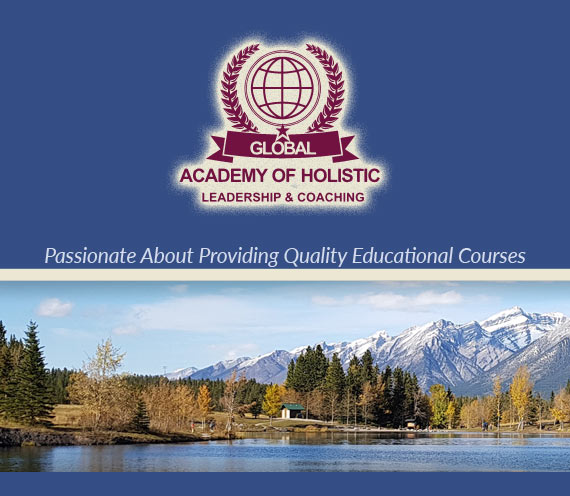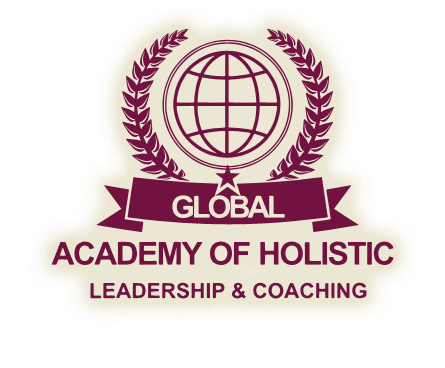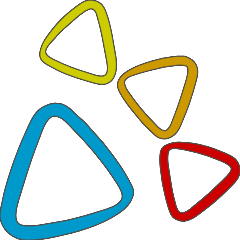- You are here:
-
Home

- Available Courses at GAHLC
Requirements not met
Your browser does not meet the minimum requirements of this website. Though you can continue browsing, some features may not be available to you.
Browser unsupported
Please note that our site has been optimized for a modern browser environment. You are using »an unsupported or outdated software«. We recommend that you perform a free upgrade to any of the following alternatives:
Windows, MacOS, Linux *
* Using a browser that does not meet the minimum requirements for this site will likely cause portions of the site not to function properly.
JavaScript either has been disabled, or your browser does not support JavaScript.
If you are unsure how to enable JavaScript in your browser, please visit wikiHow’s »How to Turn on Javascript in Internet Browsers«.
Courses ^
Global Academy of Holistic Leadership and Coaching Inc. is currently offering access to the following courses. Please select the course you are interested in for more information.
Please choose a course
-
Accounting
(Certificate Course on Accounting)
An in-depth look into the full cycle of accounting. -
Advanced Business Certificate
(17 Week Advanced Business Certificate)
A 17 weeks course covering basic skills needed for doing business. -
Advanced SPSS
(Certificate Course on Advanced SPSS)
Get hands-on experience on SPSS. -
Coaching Psychology
(Level 3 Diploma in Coaching Psychology)
Coaching Psychology applies psychological theories and concepts to the practice of coaching. -
Executive Coaching
(Executive Coaching Certificate)
Learn how to become an internationally certified coach and how to establish and operate a coaching practice. -
Football Coaching Education Program
(Level 3 Diploma Football Coaching Education Program)
The Modern-Day Football Coach -
Global Innovative Entrepreneurship
(Certificate Course on Global Innovative Entrepreneurship)
Introductions and information for business owners and entrepreneurs. -
Leadership
(Leadership Development Program)
How to build a personal leader profile and become a coach to the people. -
Quality Assurance in Teaching, Learning and Assessment
(Level 4 Certificate in Quality Assurance in Teaching, Learning and Assessment)
Learn how to become an internationally certified teacher and develop your profession and advanced skills. -
Research Methodology
(Certificate Course on Research Methodology)
Take an in-depth look into different research methods. -
Sports Management
(Level 3 Diploma in Sports Management)
Introduction of Essential Elements of Sports Management from a Global Perspective -
Sports Psychology
(Level 3 Diploma in Sports Psychology)
Provide holistic development of athletes through transpersonal psychology coupled with modern psychological perspectives. -
Taxation for Corporate Matters
(Certificate Course on Taxation for Corporate Matters)
Take an in-depth look into the corporate tax. -
Taxation for Personal Matters
(Certificate Course on Taxation for Personal Matters)
Receive a basic look into the Canadian personal tax. -
Teacher Training and Development
Diploma in Teacher Training and Development -
Transpersonal Education Philosophy
(Level 3 Certificate in Transpersonal Education Philosophy)
Transpersonal Ontology, Transpersonal Philosophy of Education, Emancipatory Concept of Higher Education -
Transpersonal Mental Health Therapy Advocacy
(Level 4 Diploma in Transpersonal Mental Health Therapy Advocacy)
Transpersonal Therapy does focus on the health of a person's spirit. -
Transpersonal Psychology I
(Level 6 Diploma in Transpersonal Psychology)
Therapeutic Intervention (Integration Of Spirituality Into Psychiatric Practice) -
Transpersonal Psychology II
(Level 6 Professional Diploma in Transpersonal Psychology)
A Transpersonal Mental Health Therapy Training
or…
Brochure
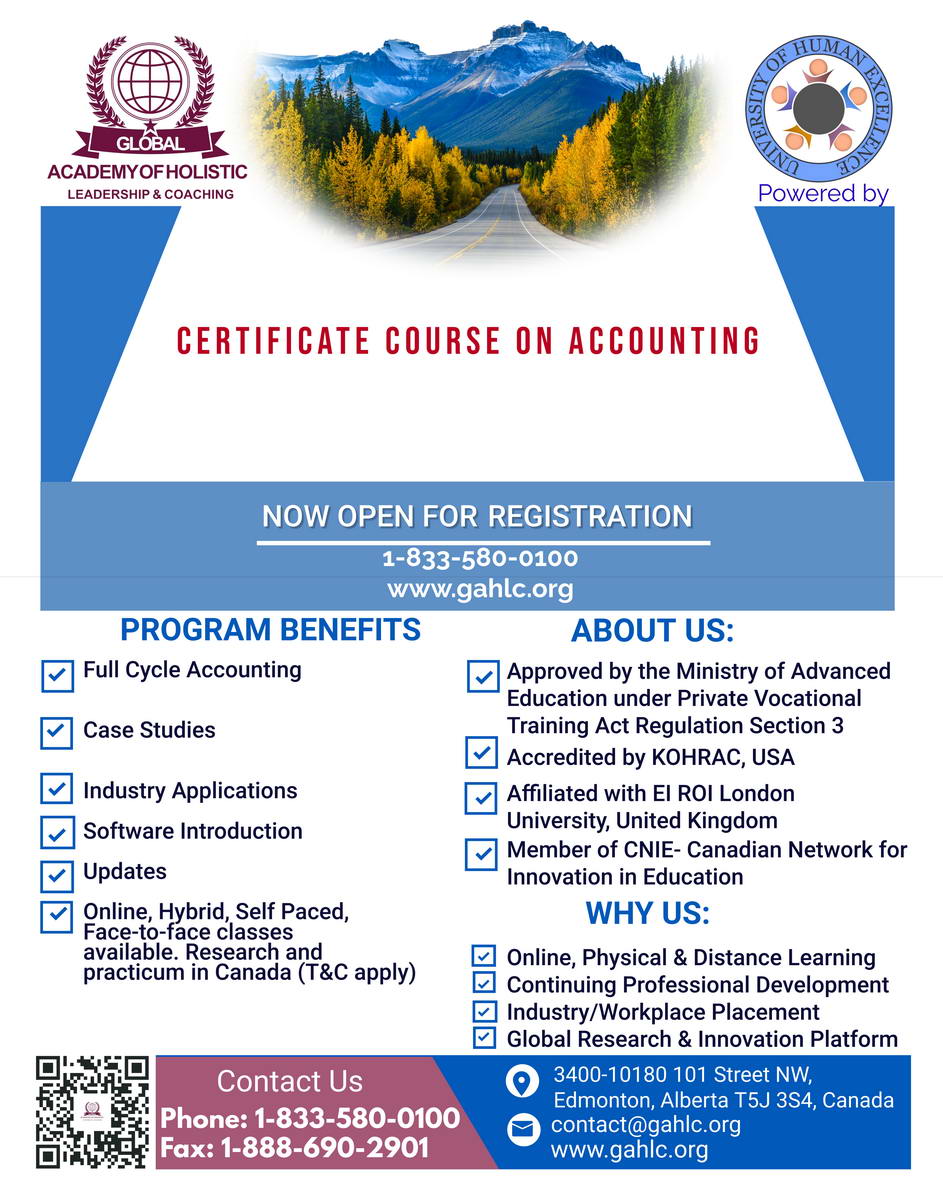
Download Brochure
GAHLC - Certificate Course on Accounting.pdf
(207 KB)
Details
- Duration: tbd
- Professor: tbd
- Units: tbd
- Prerequisites: None
This course provides an in-depth look into the full cycle of accounting. Includes case studies, industry applications, software introduction and more. With online- and face-to-face classes. Research and practicum in Canada (conditions apply).
Program Benefits
- Full Cycle Accounting
- Case Studies
- Industry Applications
- Software Introduction
- Updates
- Online, Hybrid, Self Paced, Face-to-face classes available
- Research and Practicum in Canada (Terms & Conditions apply)
Objectives
More Information coming soon.
Advanced Business Certificate
(17th Week Advanced Business Certificate) ^
A 17 weeks course covering basic skills needed for doing business.
Brochure
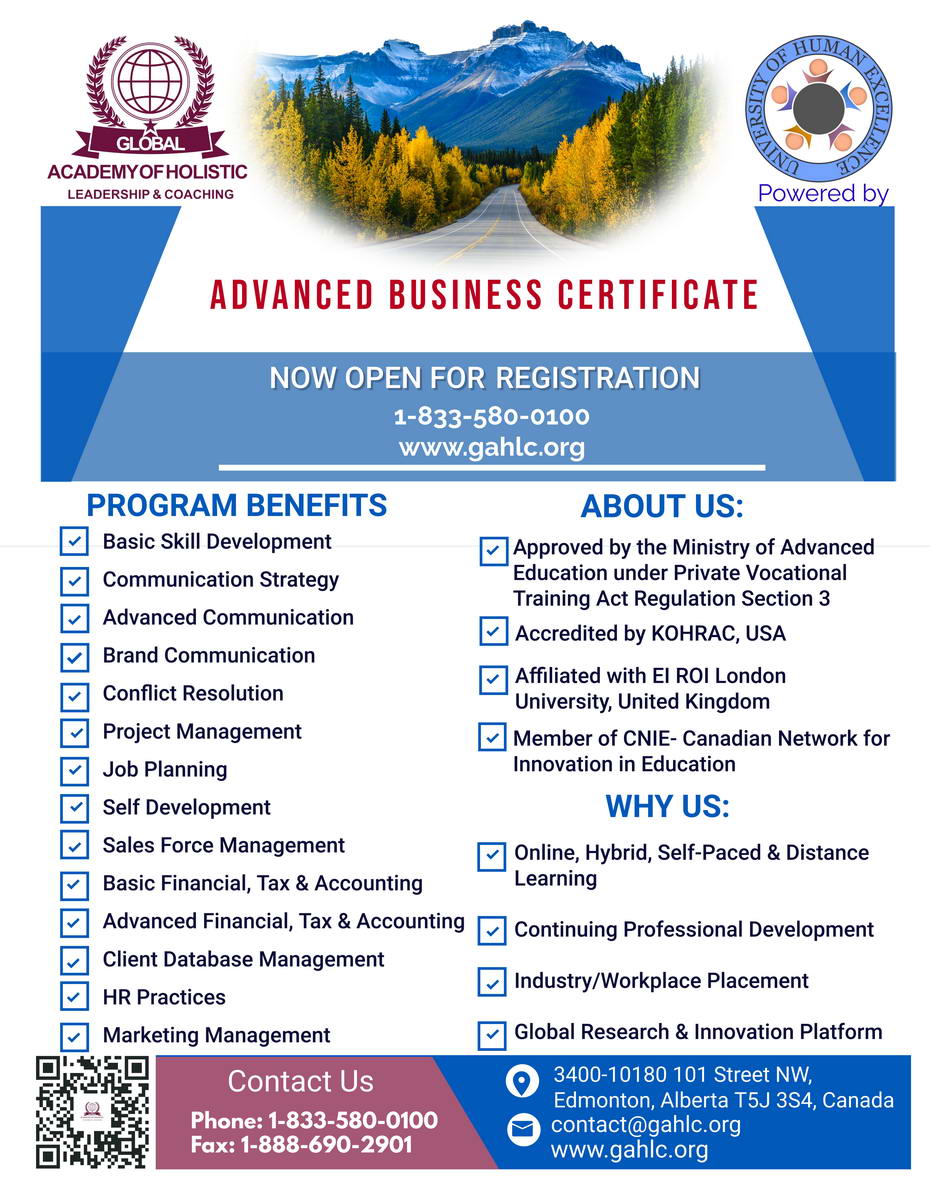
Download Brochure
GAHLC - Advanced Business Certificate.pdf
(221 KB)
Details
- Duration: 17 weeks
- Professor: tbd
- Units: 17
- Prerequisites: None
A 17 weeks course covering basic skills including building a communication strategy, brand communication, project management, Sales Force management, financial, tax & accounting, client database management, HR practices, marketing management and more.
Program Benefits
- Basic Skill Development
- Communication Strategy
- Advanced Communication
- Brand Communication
- Conflict Resolution
- Project Management
- Job Planning
- Self Development
- Sales Force Management
- Basic Financial, Tax & Accounting
- Advanced Financial, Tax & Accounting
- Client Database Management
- HR Practices
- Marketing Management
Objectives
-
Schedule
- 1st Week: Basic Skill Development
- 2nd Week: Communication Strategy
- 3rd Week: Advanced Communication and Conflict Resolution
- 4th Week: Project Management
- 5th Week: Job Responsibility Planning
- 6th Week: Brand Communication
- 7th Week: Self Development
- 8th Week: Industry Visit Practicum
- 9th Week: Sales Force Management
- 10th Week: Industry Visit and Presentation
- 11th Week: Industry Visit and Presentation
- 12th Week: Financial and Accounting
- 13th Week: Client Database Management
- 14th Week: Proposal and Advanced Financial
- 15th Week: HR Practices
- 16th Week: Marketing
- 17th Week: Final Presentation
-
1st Week
Personal SWOT analysis. Effective Communication Skills, Policy, Basic Communication Letters, short presentations, Etiquette and work ethics. Learn about the corporate culture and reviewing organizational material. Work on MS Office environment. Motivation Tools and Accelerated Learning. JOB responsibility and Job roles, Organizational Hierarchy and Organogram, Self-Motivation & Self Confidence, Active Listening and Noise. Language Pronunciation in English. English Language Learning. -
2nd Week
Communication Strategy & HR views and perspective, Office Productivity skills and working in a Team, Brands and Branding the Self, Short Projects and assignments focusing on products/services, marketing strategy and communication, Negotiations and Professional excellence. English Language Learning. Presenting One-self. Mathematical aptitude test and learning tools. Basic understanding of Social Media productivity. Motivation Strategy and POSITIVE mindset. IT tools and MS office Learning. Language Pronunciation in English. Gain General Knowledge (Arts, Culture, Literature). -
3rd Week
Advance Communication & Conflict Handling, Review of Organizational culture and report writing and content development, assignment on specific case-based learning. Review of Management cases, Legal issues in HR and HR practices. English Language Composition writing, Business Communication and Official Communication & Writing practice. Presentation of the Self and Learning so far. Field visit with GAHLC team with clients. Basic understanding of Social Media productivity. Advanced IT and MS office Learning with more emphasis on MS EXCEL and WORD. Revisit MOTIVATION and application for self-development. Gain General Knowledge (Arts, Culture, Literature). Language Pronunciation in English. English book assignment. -
4th Week
Project Management, Basic Financial understanding, Mathematical aptitude review. Presentation of the company and its various components. Perfecting the self-presentation and sales pitch. Advanced IT and MS office Learning with more emphasis on MS EXCEL and WORD. Basic focus on Graphic Design. Presentation on TOPIC based on assigned cases. Gain General Knowledge (Arts, Culture, Literature). Training your mind for performance and Management effectiveness tools. Language Pronunciation in English. Report Writing based on scenario assessment. -
5th Week
Project Management and Job Responsibility Planning, Organizational Strategy, Budgets and Financial Administration, HR and Legal issues in HR, Mathematics and Statistical parameters & review of Financial Management parameters. Advanced IT and MS office Learning with more emphasis on MS EXCEL, POWER POINT and WORD. Review of ONLINE Digital Marketing and Planning issues. Documentation preparation for client solicitation and company literature development. English Learning and issue-based presentation and extempore speech. Rewriting resume/cv and present oneself as a candidate for a particular job. Mock interviews. Meet potential clients with GAHLC Sales Team and present about GAHLC products and service (20-24 clients) and prepare presentation material. International Business and Trade Regimes, Company Law & Structure, Gain General Knowledge (Arts, Culture, Literature). Language Pronunciation in English. English Literature and Book Review assigned in Week 3. -
6th Week
Brand communication plan development of GAHLC and specific product presentation and documentation preparation. Sales Strategy and Sales Presentation Pitch internal review and practice. Leadership strategy and focusing on self-development and taking leadership in some areas of GAHLC activities. Project Management and Job Responsibility Planning, Organizational Strategy, Financial Administration and Financial Analysis. Financial Modeling, Mathematical perspective and Business statistics. Corporate Content Development, website management and relevant IT tools. Advanced MS office Learning with more emphasis on MS EXCEL, POWER POINT, WORD and ACCESS. Design ONLINE Digital Marketing and Planning strategies. Develop issue-based presentation and extempore speech and presentation of a case. Case based Learning and support in developing communication and sales strategy focused documents. International Business and Trade Regimes, Company Law & Structure, Make client presentation with GAHLC Sales Team and present about GAHLC products and service (20-24 clients) and revisit old clients. English Literature study and preparation. Language Pronunciation in English. Online research on select areas and develop/shape existing products. -
7th Week
Self presentation on learning areas so far and skills so far harnessed. Increase knowledge in HRM and FINANCIAL ADMINISTRATION. Study on Effective Communication, Leadership Skills, Negotiation, Conflict handling skills, Active Listening Skills, Strategic Management and Porters’ Model, Some needed Business Management Theories. Sit for mock interviews for a professional job position. International Business and Trade Regimes, Company Law & Structure, Tax Structure Local and International. Develop Language. Gain General Knowledge (Arts, Culture, Literature). Language Pronunciation in English. Fluency and Effective Communication. -
8th Week
Client visit to new 12-15 clients and visit old clients. Review of activities and learning from the previous 3 weeks. Sit for internal assessment. Re-visit SWOT analysis and fill the gaps of weaknesses. Self-Development Exercises, prepare office documentations and client proposals, Business Plan Development, Selling Skills, Marketing Techniques, Sales Presentations, etc. Spoken English and Presentation
CREATIVE ZONE
The candidate picks his or her unique new areas of advancement and share with GAHLC program. In this scenario, some relaxation will be allowed on the work activities planned for the 8th week. -
9th Week
Sales Force Management, Presentation techniques for successful selling, 360 degrees. performance cycle, 7 and 8 Habits (Steven Covey), etc. Review of contemporary business literature in the field and add into the content of GAHLC. Prepare for phone solicitations and practice tele sales or tele promotions. Practice a 1-minute, 2-minute and 5-minute sales pitch along with organizational and self-introduction. Develop language fluency and effective communication. Organize client database using access. Basics of Economics (Micro & Macro). Gain General Knowledge (Arts, Culture, Literature). Presentation of learning in the past 3 weeks. -
10th Week
Client visit to new 12-15 clients, revisit all the previous clients visited in the past two weeks and call the remaining clients. Phone solicitations and practice tele sales or tele promotions. Practice a 1-minute, 2-minute and 5-minute sales pitch along with organizational and self-introduction. Additional understanding of graphic design. Prepare internal presentation using all facets of technology, IT tools, etc. for a corporate presentation. Learn advanced Excel, PowerPoint & Word. Public speaking practice with specific topic extempore and set. -
11th Week
Client visit to new 12-15 clients, revisit all the previous clients visited in the past two weeks and call the remaining clients. Input in client database. Additional understanding of graphic design. Prepare internal presentation using all facets of technology, IT tools, etc. for a corporate presentation. Learn advanced Excel, PowerPoint & Word. Basics of Economics (Micro & Macro). Change Management and Organizational Behavior and Impacts. Public speaking practice with specific topic extempore and set. English Book Review and Presentation.
CREATIVE ZONE
The candidate picks his or her unique new areas of advancement and share with GAHLC program. In this scenario, some relaxation will be allowed on the work activities planned for the 11th week. -
12th Week
Revisit old clients (20). Revise proposals and re-submit. Review of FINANCIAL and Accounting Management. Assist in developing the GAHLC program. Additional understanding of graphic design. Input in client database. Improve the presentation using all facets of technology, IT tools, etc. for a corporate presentation. Public speaking practice with specific topic (extempore and set). Review some business cases and write summary of learning. Develop a learning documentation / content as per GAHLC guidance. English Book Review and Presentation. -
13th Week
Develop client database. Visit old clients (20) and new clients 10. Revise proposals and re-submit. Review of advanced issues in FINANCIAL and Accounting Management. Assist in developing the GAHLC program. Advance client database and input. Update resume and sit for internal interview. Revisit the SWOT and work on the gaps and improve on advancement areas. Add to the learning content upon input from GAHLC leading to a workbook of the program. Public speaking practice with specific topic (extempore and set). -
14th Week
Revise proposals and re-submit. Review of advanced issues in FINANCIAL and Accounting Management. Perform online tele marketing to companies with specific intention of sharing company information and for securing meetings. Organizational strategy and visioning process revisited. Business Sustainability & Entrepreneurship. Set at least 10 meetings for the week and the next. Work on some areas of graphic designs and online media and online content. Revise content with input from GAHLC leading to a workbook of the program. Support internal administrative tasks. -
15th Week
Promote the GAHLC program within universities and students. Promote HR products with corporates. Develop proficiency in IT areas (MS OFFICE and IT for training). Continue to learn advancement FINANCIAL, Administrative and Accounting Management. Basics of Economics (Micro & Macro). Perform online tele marketing to companies with specific intention of sharing company information and for securing meetings. Revise and add relevant content with input from GAHLC leading to a workbook of the program. Set at least 7 new business meetings and visit old clients (8-10). Work on some areas of graphic designs / web design and online media and online content. Business Sustainability & Entrepreneurship. Make internal presentation with a personal 1- minute, 2-minute and 5-minute pitch and perform another self-SWOT analysis and address areas of change and improvement. -
16th Week
Perform online tele marketing to companies with specific intention of sharing company information and for securing meetings. Promote the GAHLC program within universities and students. Present the program learning documentation / content for final input. Additional work on graphic design and standard web design. Make final changes in resume and develop further the personal 1-minute, 2-minute and 5-minute presentation. Review all the material covered in the past 3.5 months. -
17th Week
Final Presentation of program learning documentation / content as a workbook. Hand over the WORKBOOK incorporating learning areas and knowledge areas to explore from the program. Hand over the database of clients with details. Make a 15-minute presentation of SELF, LEARNING and ways to CHANGE the world. Receive a Certificate of Completion with satisfaction or distinction.
Brochure
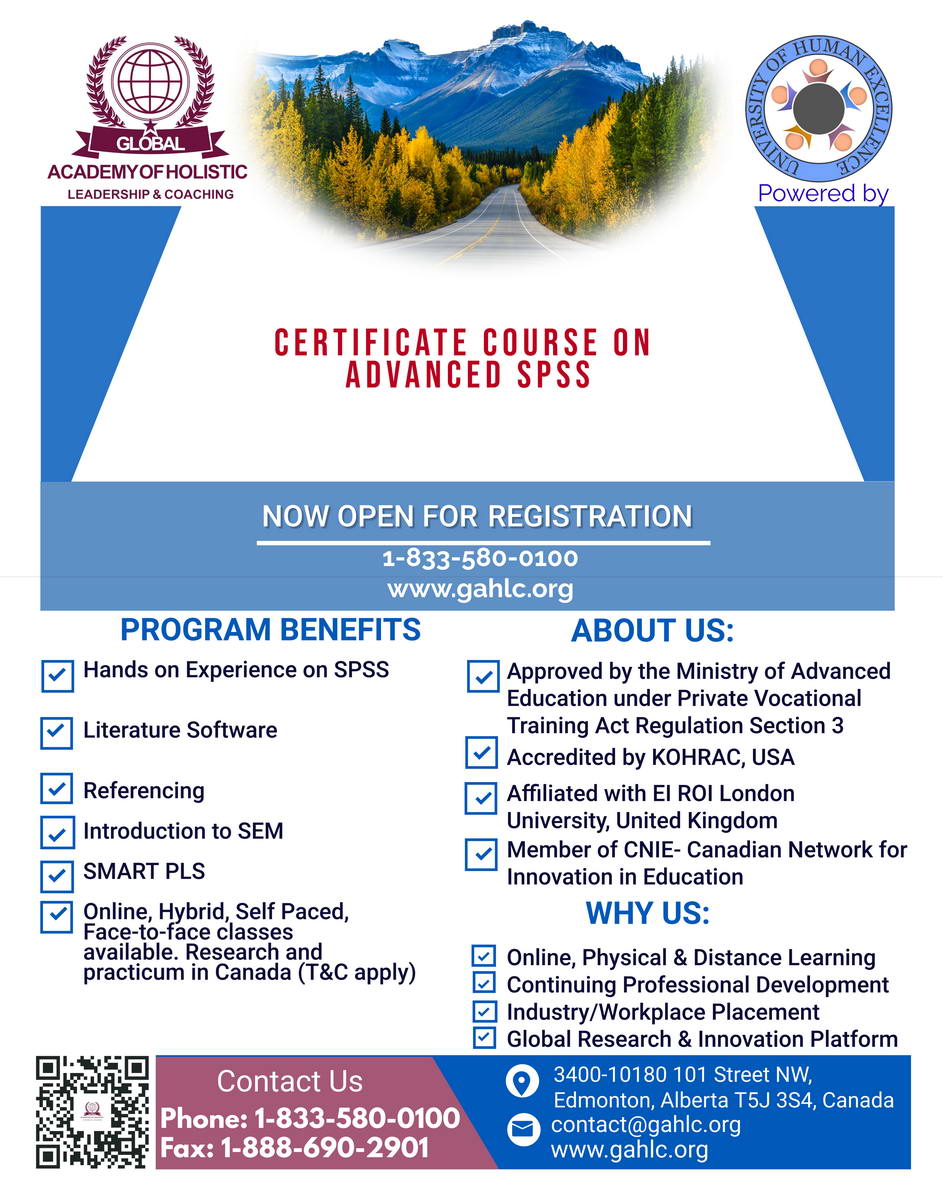
Download Brochure
GAHLC - Certificate Course on Advanced SPSS.pdf
(208 KB)
Details
- Duration: 10 weeks
- Professor: tbd
- Units: tbd
- Prerequisites: None
Get hands-on experience on SPSS with this course. Includes literature software, referencing, an introduction to SEM, and SMART PLS. With online- and face-to-face classes. Research and practicum in Canada (conditions apply).
Program Benefits
- Hands on Experience on SPSS
- Literature Software
- Referencing
- Introduction to SEM
- SMART PLS
- Online, Hybrid, Self Paced, Face-to-face classes available
- Research and Practicum in Canada (Terms & Conditions apply)
Objectives
-
Delivery Moods
LIVE streaming through ZOOM with global professors. Each week 2 sessions of 1 hour and 30 minutes activities. So, total 3 hours session per week. 36 hours LIVE sessions and 36 hours independent learning. So, total 72 hours of learning.
Learning Outcomes- Software’s and Introduction to SEM and Smart PLS
Final 2 weeks include hands on experience on SPSS, Literature Software’s, and Referencing.
Coaching Psychology
(Level 3 Diploma in Coaching Psychology) ^
Coaching Psychology applies psychological theories and concepts to the practice of coaching.
Brochure
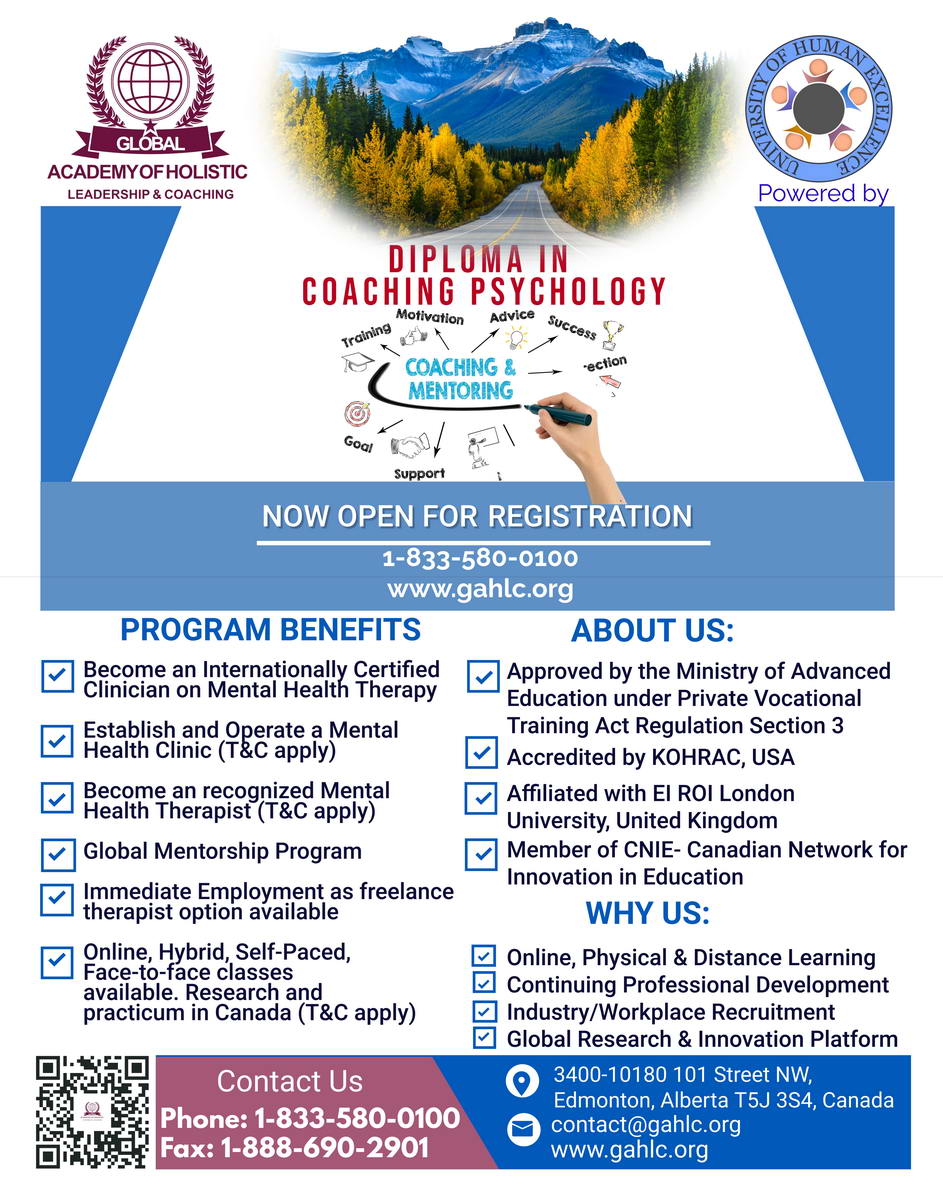
Download Brochure
GAHLC - Diploma in Coaching Psychology.pdf
(239 KB)
Details
- Duration: 8 months
- Professor: Prof. Oluwafemi Esan
- Units: 8
- Prerequisites: None
An eight months diploma course that aims to increase performance, achievement and well-being in individuals, teams and organizations by utilizing evidence-based methods grounded in scientific research and coaching approaches that are informed by psychology.
Program Benefits
- Become an Internationally Certified Clinician on Mental Health Therapy
- Establish and Operate a Mental Health Clinic (Terms & Conditions apply)
- Become an recognized Mental Health Therapist (Terms & Conditions apply)
- Global Mentorship Program
- Immediate Employment as Freelance Therapist option available
- Online, Hybrid, Self Paced, Face-to-face classes available
- Research and Practicum in Canada (Terms & Conditions apply)
Aim
Coaching psychology is a field of applied psychology that applies psychological theories and concepts to the practice of coaching. It aims to increase performance, achievement and well-being in individuals, teams and organizations by utilizing evidence-based methods grounded in scientific research. A Coaching Model is a method designed to guide an individual through a process from where they are currently to where they want to be. A coaching model aims to create a framework for guiding another person to establish the desired goal. A Coaching Psychologist is essentially a psychologist who works with others to support the enhancement of performance, development, and well-being using psychology informed coaching approaches.
Structure
-
Unit 1: Introduction To Coaching Model
There are various effective coaching models that some coaches choose to use to structure their coaching sessions. You may find it helpful to guide your coachee through a logical sequence and provide a framework for your coaching session. Using a model helps in many ways. It helps to give a purpose to the session by defining an outcome, preventing it from becoming a 'chat' with no apparent purpose. It can also be a prompt to ensure that the session stays 'on track. The coach's skill is in knowing what your client needs at a particular moment, so a toolkit of different models is helpful to draw upon and use as appropriate. Probably the most widely known and used model is the GROW coaching model. This simple model helps you as a coach take your coachee from goal setting at the outset of the session through to exploring where they now concern their goals, exploring options they have to moving forward and concluding with a commitment to action. -
Unit 2: Theoretical Approach 1 – The Transpersonal Approach To Coaching
Transpersonal coaching is based on transpersonal psychology and actively engages with an individual's Spiritual Intelligence (SQ), building on Emotional Intelligence (EQ) to enable deeper and broader perspectives on the challenges we face today.
Finding meaning: The best–known exponent of transpersonal coaching is Sir John Whitmore, executive chairman of Performance Consultants International. "In recent years, people – especially in Western cultures – are waking up to the transpersonal within themselves, through the emerging need to find meaning and purpose in all aspects of their lives, and to work in the service of something beyond just making a profit", he says. -
Unit 3: Theoretical Approach 2 – The Solution Focus Approach To Coaching
What is Solution Focused? It is an approach to coaching based on opening new options for the client by asking questions that focus her/him/them on designing solutions that can be reached instead of analysing problems in the hope of finding a way out of them. The solution-focused model holds that focusing only on problems is not an effective way of solving them. Instead, SFBT targets clients' default solution patterns, evaluates them for efficacy, and modifies or replaces them with problem-solving approaches that work. -
Unit 4: Introduction To Coaching Skills
Goal setting. Coaching is a goal-focused (or solution-focused) approach. The ability to elicit clear, well-defined, and emotionally engaging goals from a coachee is one of the most important skills for a coach to possess.- Looking
- Listening
- Empathizing
- Questioning
- Giving feedback
- Intuiting
- Checking
- Be agenda-less. Although it can be hard to coach someone in your team, don't have your own agenda; be focused on theirs.
- Be ego-less
- Demonstrate good listening skills
- Have an aura of calm
- Watch your body language
- Be interested and respectful
- Keep your mind open and non-judgmental
- Be supportive and challenging
-
Unit 5: Coaching Leadership Style
The Coaching Leadership Style is a relatively new and guiding leadership style. Instead of making all decisions and delegating tasks yourself, as is the case in the autocratic leadership style, the coaching leader takes the lead to get the best out of his employees or team. Coaching leadership is characterized by collaboration, support, and guidance. Coaching leaders are focused on bringing out the best in their teams by guiding them through goals and obstacles. This leadership style is very much opposite to autocratic leadership, which is focused on top-down decision making. This leadership style focuses on developing individuals, nurturing the learning process, and focusing on long-term improvements. Companies are recognizing the value of this approach and investing more into training leaders to be coaches. -
Unit 6: Team Coaching
In Team Coaching, the client is a real team, including the team leader and their direct reports. They work together for common goals against which the whole team's performance is evaluated. Individuals in a team are therefore interdependent. In Team Coaching, the client is a real team. The team coaching process helps teams align around a common purpose, establish inspiring spirit and vision, define clear roles, commit to team accountability, make powerful choices and take affirmative action. -
Unit 7: Skills and Performance Coaching
Performance Coaching is a process where one person facilitates the development and action planning of another to bring about changes in their lives. Performance Coaching helps you move forward at your pace within an equal and trusting relationship. Improves individual performance. Helps identify and develop high potential employees. It helps identify both organizational and individual strengths and development opportunities. High-performance coaching may also involve working with other people within your organization – collaborating with other managers and leaders to make the workplace a high-performance organization that helps everybody perform at their best. -
Unit 8: Evidence-based Coaching / Coaching Project
An evidence-based approach to coaching is essential to the field and coaching professionals. It adopts an informed-practitioner model (Grant, 2005) that helps coaches better predict our interventions' outcomes, making us more effective this effectiveness turn, enhancing our credibility. "evidence-based" refer to the intelligent and conscientious use of relevant and best current knowledge integrated with professional practitioner expertise in making decisions about how to deliver coaching to coaching clients and in designing and providing a coach training program. Coaches utilizing an evidence-based approach use empirical research based on their observations and experiences, drawing upon their knowledge of the behavioural sciences, psychology, and coaching best practices. As such, they're able to gather evidence and offer clients more effective and accurate assessments, along with positive results. Evidence-based coaching is rooted in proven science, and professionals with the proper education, training, and certifications stand apart from those using unproven coaching approaches. The students will conduct 60 hours of a coaching session with evidence from a coaching log. This unit will be assessed by a reflective report on the 60 hours of a coaching session. The Reflective essay will be a 1500 word count. Video evidence of 3 coaching sessions is required to pass this unit.
Assessment
Assessment of the award is completed based on the learning outcomes achievement at the unit's assessment criteria standards. Therefore, the learner can achieve a Pass or Fail for each unit based on the quality of the work submitted and the assessor's judgments made against the criteria provided.
The Level 3 Diploma in Coaching Psychology assessment is completed by submitting internally assessed learner work. This work is subject to external moderation or verification. The award is assessed by written course work of 6500-word count (1000 word count for each unit). However, Unit 6 will be assessed by a reflective report on the 60 hours of a coaching session. The reflective essay will be a 1500 word count. Video evidence of 3 coaching sessions is required to pass this unit.
Entry Requirements
The typical minimum requirements for learners who have recently been in education or training is likely to include one of the following:
- 5 or more GCSEs at grades C and above or Grade 4 and above
- Another related level 2 subjects
- Other equivalent international qualifications
Learners will need to have an appropriate Level 2 standard in English to access resources and complete the unit assignments.
Executive Coaching
(Executive Coaching Certificate) ^
Learn how to become an internationally certified coach and how to establish and operate a coaching practice.
Brochure
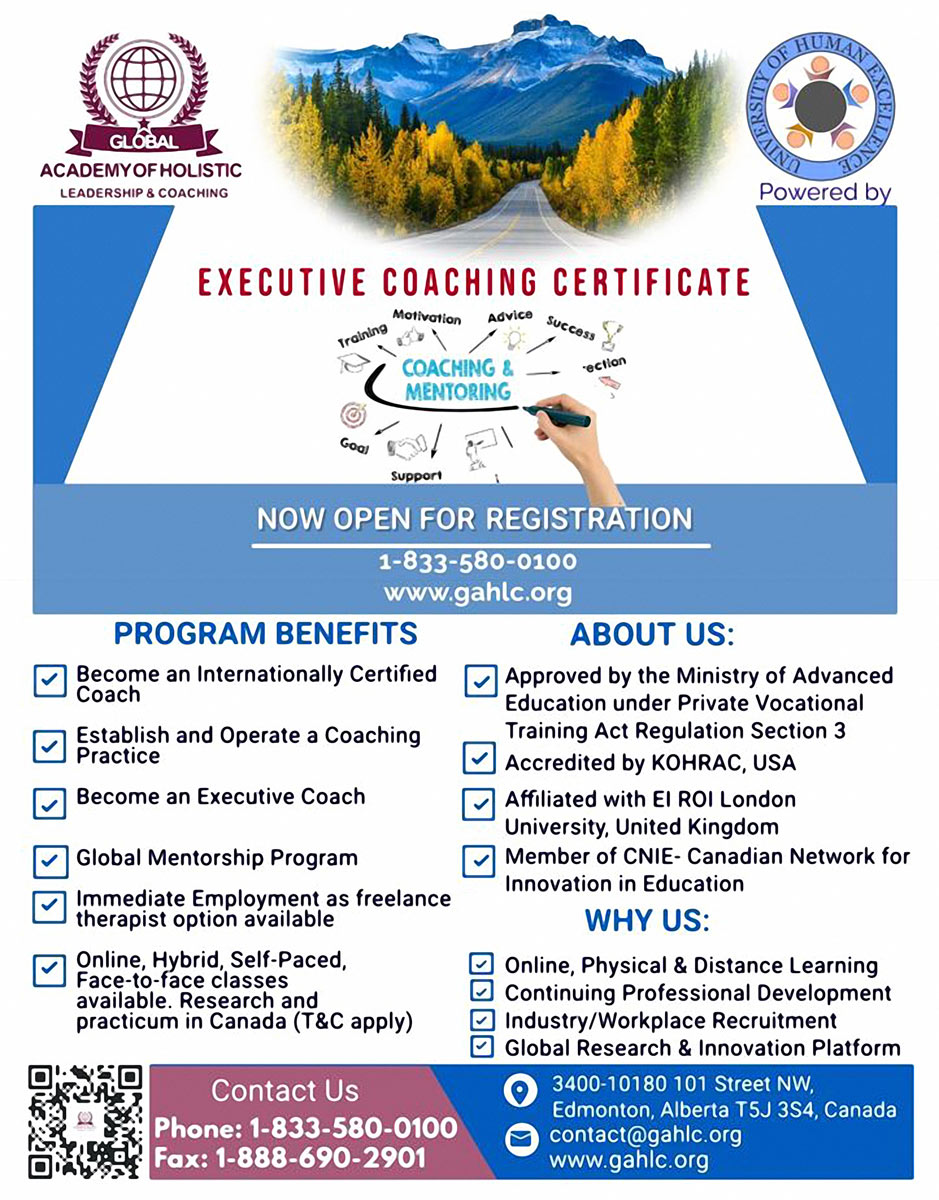
Download Brochure
GAHLC - Executive Coaching Certificate.pdf
(249 KB)
Details
- Duration: tbd
- Professor: tbd
- Units: tbd
- Prerequisites: None
Learn how to become an internationally certified coach and how to establish and operate a coaching practice. With Global Mentorship Program, online- and face-to-face classes. Research and practicum in Canada (conditions apply).
Program Benefits
- Become an Internationally Certified Coach
- Establish and Operate a Coaching Practice
- Become an Executive Coach
- Global Mentorship Program
- Immediate employment option available
- Online, Hybrid, Self Paced, Face-to-face classes available
- Research and Practicum in Canada (Terms & Conditions apply)
Objectives
More Information coming soon.
Football Coaching Education Program
(Level 3 Diploma Football Coaching Education Program) ^
The Modern-Day Football Coach
Brochure
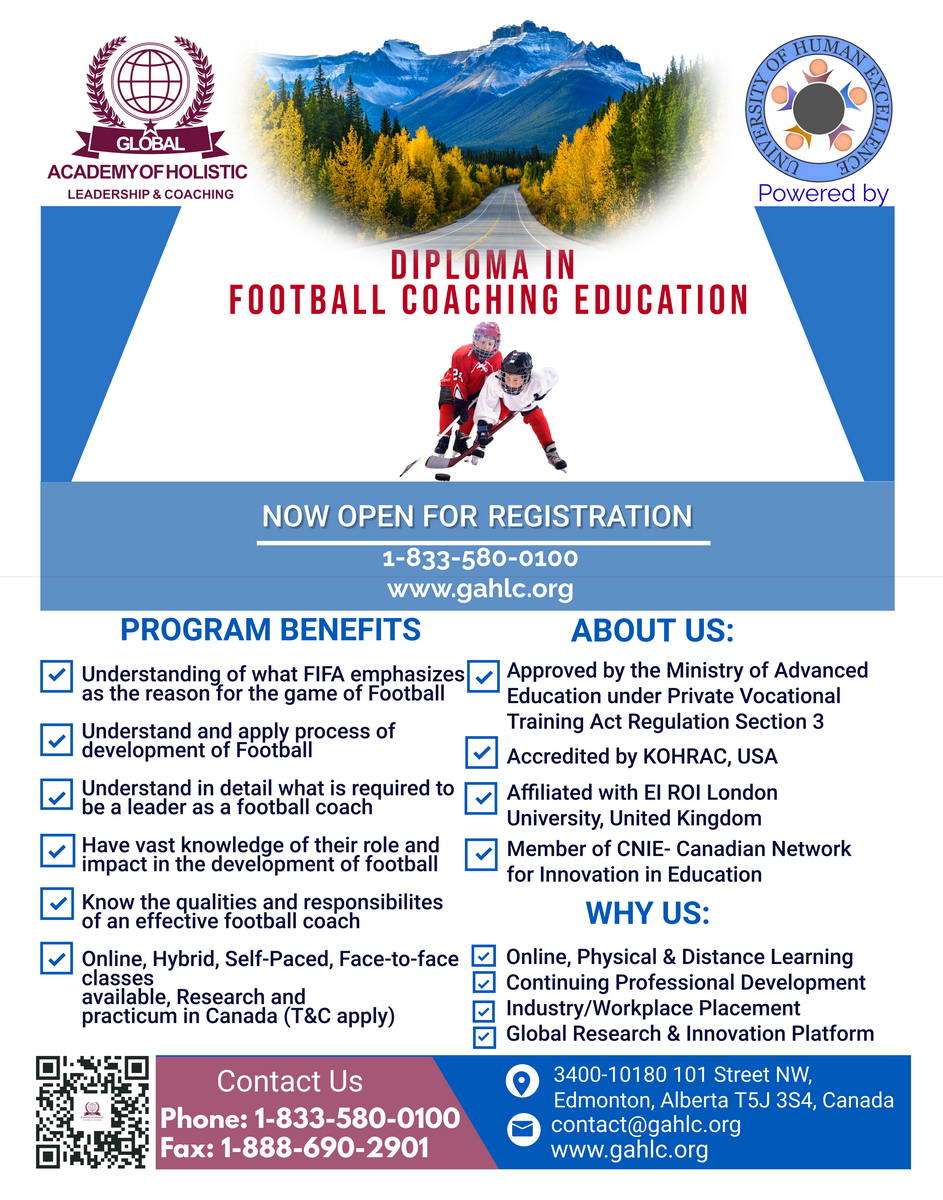
Download Brochure
GAHLC - Diploma in Football Coaching Education.pdf
(235 KB)
Details
- Duration: 9 months
- Professor: Prof. Oluwafemi Esan and Dr. Henry Abiodun
- Units: 9
- Prerequisites: None
A nine months course covering a large scope of topics including the purpose of the game, the basic areas of football fitness, the method of teaching and coaching, the system of training, the principles of the game, and recovery and regeneration tactics.
Program Benefits
- Understandinq of what FIFA emphasizes as the reason for the game of Football
- Understand and apply process of development of Football
- Understand in detail what is required to be a leader as a football coach
- Have vast knowledge of their role and impact in the development of football
- Know the qualities and responsibilites of an effective football coach
- Online, Hybrid, Self Paced, Face-to-face classes available
- Research and Practicum in Canada (Terms & Conditions apply)
Summary
The Football Specifics module of ‘The Modern-Day Football Coach’ Course aims to give students a focused look at what it takes to be a football coach in the modern age of the game. It creates a strong foundation that coaches can use as a guide for their football-coaching journey. Students will learn how they can make an impact in the of the game football by investing a large scope of topics that include the Purpose of the Game, Basic Areas of Football Fitness, the Method of Teaching and Coaching, the System of Training, Principles of the Game, and Recovery and Regeneration.
Objectives
-
Purpose of the Game
At the end of this unit, students should- Have a thorough understanding of what FIFA emphasizes as the reason for the game of football.
- Understand and apply the process of development in football
- Understand in detail what is required to be a leader as a football coach
- Have vast knowledge of their role and impact in the development of football
- Know the qualities and responsibilities of an effective football coach
-
Basic Areas of Football Fitness
At the end of this unit, students should- Know and itemize the 6 areas of football fitness
- Be able to plan training sessions using all the areas of football fitness
- Have a good understanding of the methodology of a training session
- Know the progression of a training session and be able to implement it
-
Method of Teaching and Coaching
At the end of this unit, students should- Have a thorough understanding of the method of coaching at the 3 levels of play
- Be able to differentiate between teaching and coaching
- Know thoroughly the aim of coaching football
- Know the agents of coaching (its materials and measures)
-
System of Training
At the end of this unit, students should- Have a very good understanding of the purpose of training
- Know the system of training and its elements
- Be able to use the principles as a guide for the designing and modification of their training sessions
-
Principles of the Game (Attack and Defense)
At the end of this unit, students should- Be able to name all the principles of attack and defense
- Understand the importance of the principles of attack and defense in relation to the game
- Identify the operations of the principles of the game on their own team as well as the opposition’s team
-
Recovery and Regeneration in Football players
At the end of this unit, students should- Understand the importance of recovery and regeneration
- Be able to differentiate between recovery and regeneration
- Be able to differentiate between mental recovery and physical recovery
- Understand and plan an ideal recovery session
- Identify best drinks for recovery
-
Introduction To Coaching Model
There are various effective coaching models that some coaches choose to use to structure their coaching sessions. You may find it helpful to guide your coachee through a logical sequence and provide a framework for your coaching session. Using a model helps in many ways. It helps to give a purpose to the session by defining an outcome, preventing it from becoming a 'chat' with no apparent purpose. It can also be a prompt to ensure that the session stays 'on track. The coach's skill is in knowing what your client needs at a particular moment, so a toolkit of different models is helpful to draw upon and use as appropriate. Probably the most widely known and used model is the GROW coaching model. This simple model helps you as a coach take your coachee from goal setting at the outset of the session through to exploring where they now concern their goals, exploring options they have to moving forward and concluding with a commitment to action.
Learning Outcomes
At the end of this unit, students will be able to- Define Coaching As A Model For Personal and Professional Development
- Describe The GROW Coaching Model
-
Team Coaching
In Team Coaching, the client is a real team, including the team leader and their direct reports. They work together for common goals against which the whole team's performance is evaluated. Individuals in a team are therefore interdependent. In Team Coaching, the client is a real team. The team coaching process helps teams align around a common purpose, establish inspiring spirit and vision, define clear roles, commit to team accountability, make powerful choices and take affirmative action.
Learning Outcomes
At the end of this unit, students will be able to- Explain Team Coaching Model
- Describe the benefits of Team Coaching
-
Theoretical Approach 1 – The Transpersonal Approach to Coaching
Transpersonal coaching is based on transpersonal psychology and actively engages with an individual's Spiritual Intelligence (SQ), building on Emotional Intelligence (EQ) to enable deeper and broader perspectives on the challenges we face today.
Finding meaning: The best–known exponent of transpersonal coaching is Sir John Whitmore, executive chairman of Performance Consultants International. "In recent years, people – especially in Western cultures – are waking up to the transpersonal within themselves, through the emerging need to find meaning and purpose in all aspects of their lives, and to work in the service of something beyond just making a profit", he says.
Learning Outcomes
At the end of this unit, students will be able to- Define Transpersonal Psychology
- Describe The Importance of Spiritual Coaching In Personal Development
Global Innovative Entrepreneurship
(Certificate Course on Global Innovative Entrepreneurship) ^
Introductions and information for business owners and entrepreneurs.
Brochure
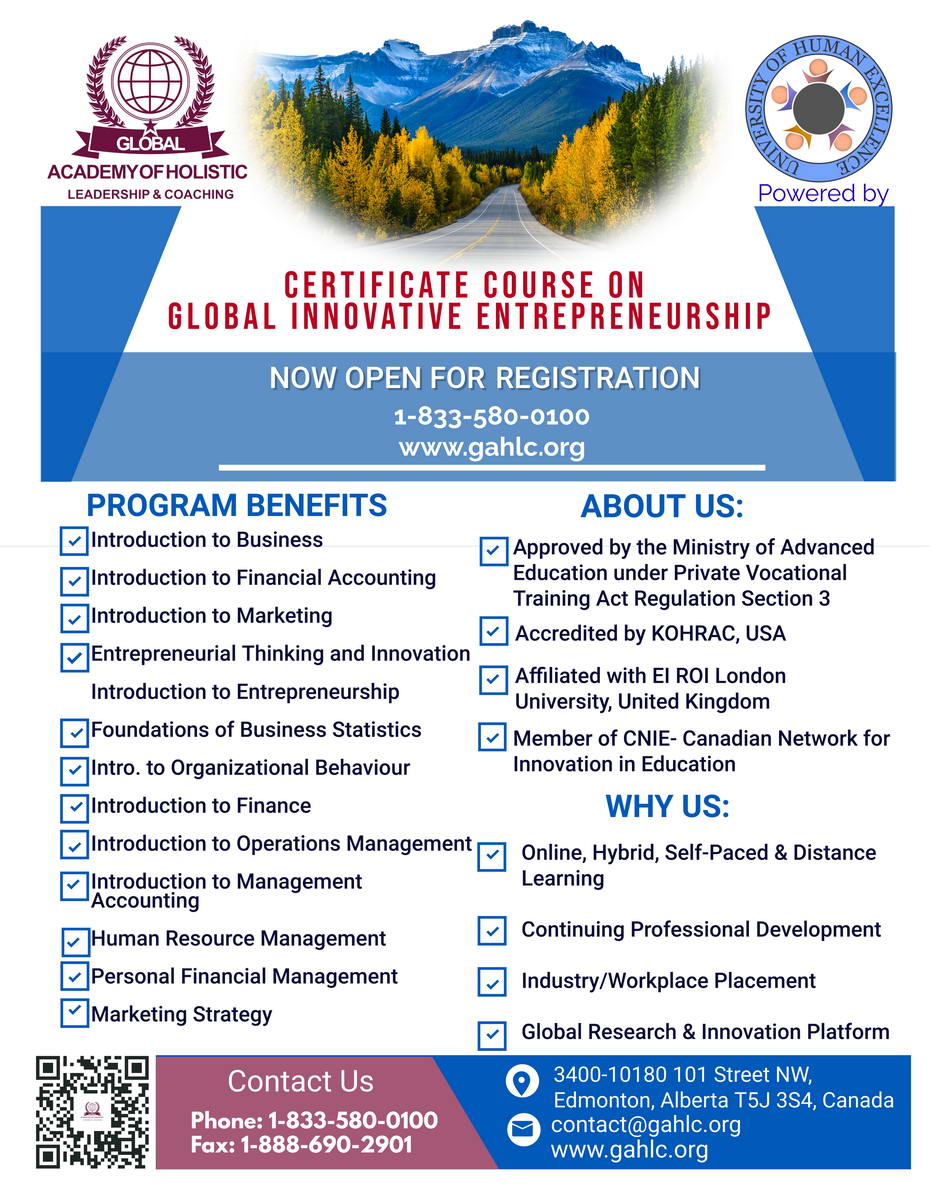
Download Brochure
GAHLC - Certificate Course on Global Innovative Entrepreneurship.pdf
(233 KB)
Details
- Duration: tbd
- Professor: tbd
- Units: tbd
- Prerequisites: None
A course giving introductions and information to business, financial accounting, marketing, entrepreneurship, organizational behaviour, operations management, entrepreneurial thinking and innovation, foundations of business statistics.
Program Benefits
- Introduction to Business
- Introduction to Financial Accounting
- Introduction to Marketing
- Entrepreneurial Thinking and Innovation
- Introduction to Entrepreneurship
- Foundations of Business Statistics
- Introduction to Organizational Behaviour
- Introduction to Finance
- lntroduction to Operations Management
- Introduction to Management Accounting
- Human Resource Management
- Personal Financial Management
- Marketing Strategy
Objectives
More Information coming soon.
Leadership
(Leadership Development Program) ^
How to build a personal leader profile and become a coach to the people.
Brochure
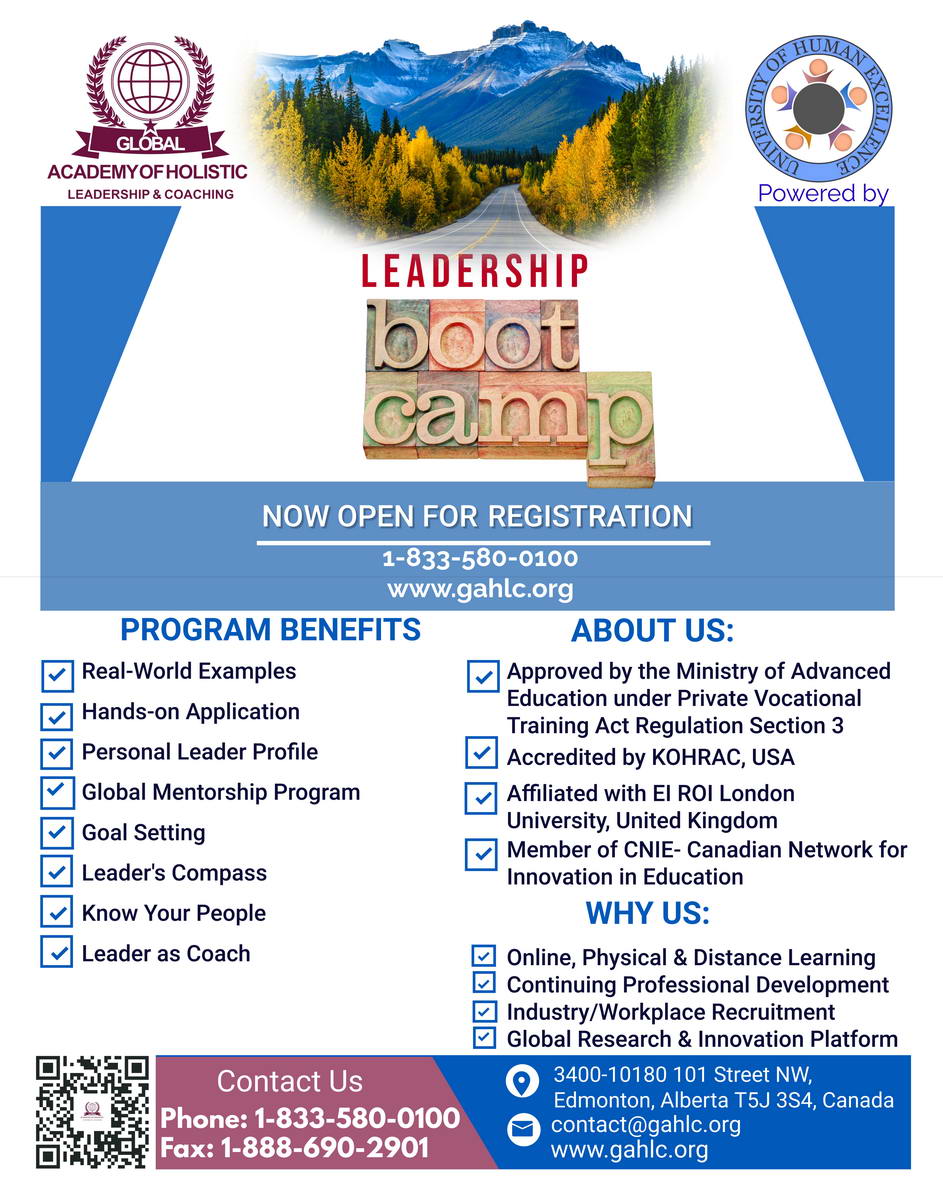
Download Brochure
GAHLC - Leadership Development Program.pdf
(212 KB)
Details
- Duration: tbd
- Professor: tbd
- Units: tbd
- Prerequisites: None
A course that includes real world examples covering topics like building a personal leader profile, global mentorship program, setting goals, becoming a coach to the people, and more.
Program Benefits
- Real-World Examples
- Hands-on Application
- Personal Leader Profile
- Global Mentorship Program
- Goal Setting
- Leader's Compass
- Know Your People
- Leader as Coach
Objectives
More Information coming soon.
Quality Assurance in Teaching, Learning and Assessment
(Level 4 Certificate in Quality Assurance in Teaching, Learning and Assessment) ^
Learn how to become an internationally certified teacher and develop your profession and advanced skills.
Brochure
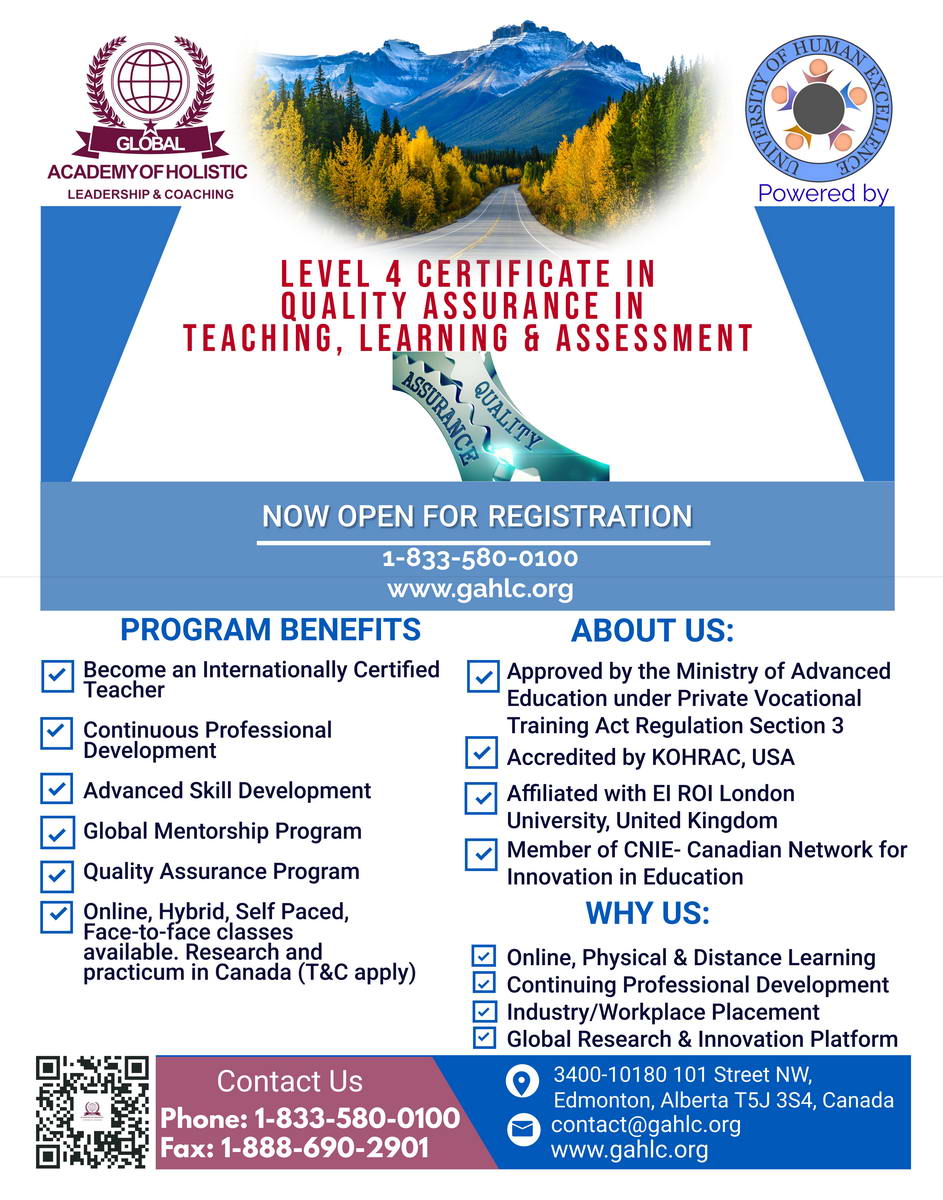
Download Brochure
GAHLC - Certificate in Quality Assurance in Teaching, Learning and Assessment.pdf
(228 KB)
Details
- Duration: tbd
- Professor: tbd
- Units: tbd
- Prerequisites: None
Learn how to become an internationally certified teacher. Develop your profession and advanced skills. With global mentorship program, quality assurance program, online- and face-to-face classes. Research and practicum in Canada (conditions apply).
Program Benefits
- Become an Internationally Certified Teacher
- Continuous Professional Development
- Advanced Skill Development
- Global Mentorship Program
- Quality Assurance Program
- Online, Hybrid, Self Paced, Face-to-face classes available
- Research and Practicum in Canada (Terms & Conditions apply)
Objectives
More Information coming soon.
Research Methodology
(Certificate Course on Research Methodology) ^
Take an in-depth look into different research methods.
Brochure
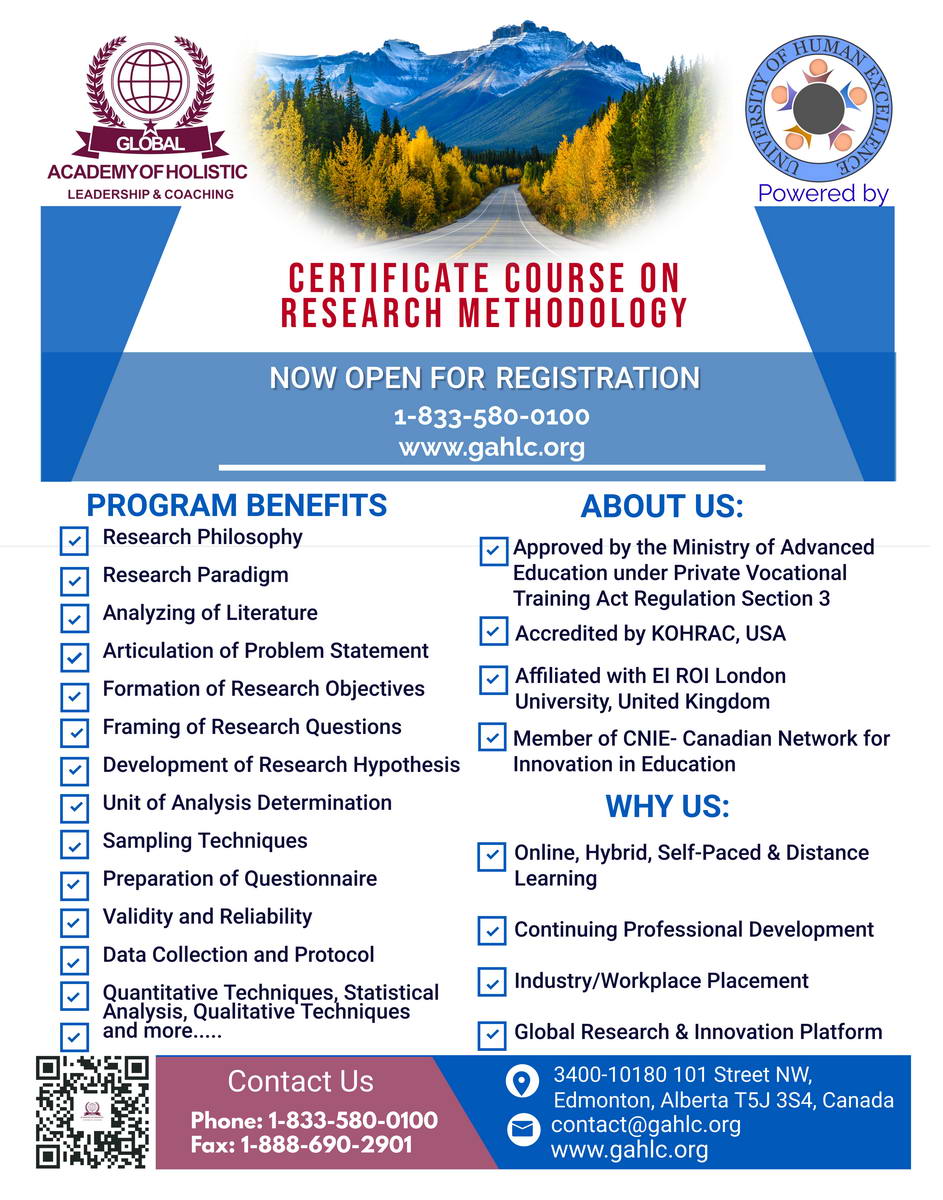
Download Brochure
GAHLC - Certificate Course on Research Methodology.pdf
(231 KB)
Details
- Duration: 8 weeks
- Professor: tbd
- Units: tbd
- Prerequisites: None
An eight weeks course teaching about different research methods including the philosophy and paradigm of research, analyzing literature, articulating problems, building objectives, framing questions, developing hypothesis, sampling techniques, data collection protocols and more.
Program Benefits
- Research Philosophy
- Research Paradigm
- Analyzing of Literature
- Articulation of Problem Statement
- Formation of Research Objectives
- Framing of Research Questions
- Development of Research Hypothesis
- Unit of Analysis Determination
- Sampling Techniques
- Preparation of Questionnaire
- Validity and Reliability
- Data Collection and Protocol
- Quantitative Techniques, Statistical Analysis, Qualitative Techniques and more
Objectives
-
Delivery Moods
LIVE streaming through ZOOM with global professors. Each week 2 sessions of 1 hour and 30 minutes activities. So, total 3 hours session per week. 24 hours LIVE sessions and 24 hours independent learning. So, total 48 hours of learning.
Learning Outcomes- Research Philosophy
- Research Paradigm
- Analyzing of Literature
- Articulation of Problem Statement
- Formation of Research Objectives
- Framing of Research Questions
- Development of Research Hypothesis
- Unit of Analysis Determination
- Sampling Techniques
- Preparation of Questionnaire
- Validity and Reliability
- Data Collection Protocol
- Quantitative Techniques
- Statistical Analysis
- Qualitative Techniques
- Focus Group Discussion
- Key Informant Interviews
- Triangulation
Analysis of data with recommendation framing will be the main contents of this nano program.
Sports Management
(Level 3 Diploma in Sports Management)^
Introduction of Essential Elements of Sports Management from a Global Perspective
Brochure
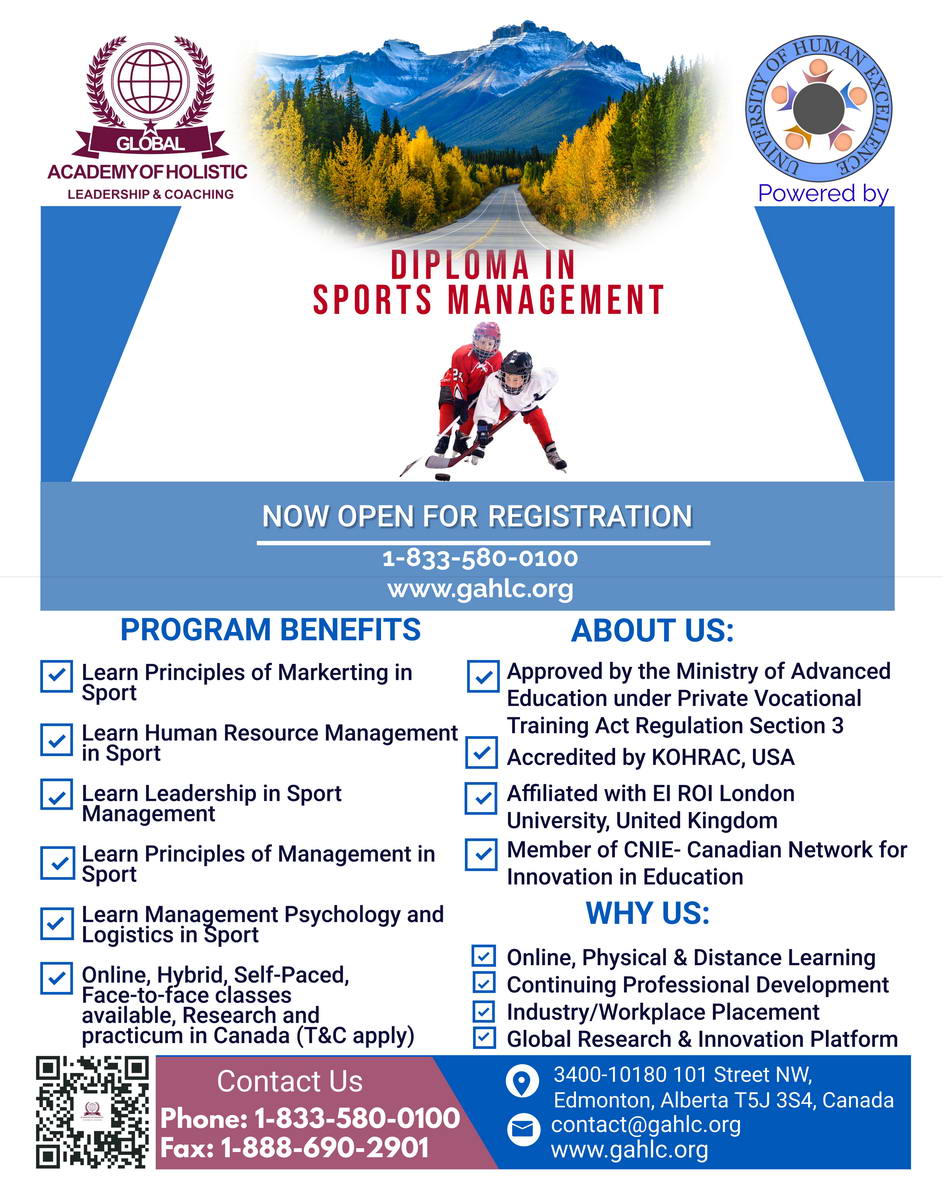
Download Brochure
GAHLC - Diploma in Sports Management.pdf
(227 KB)
Details
- Duration: 6 months
- Professor: Prof. Oluwafemi Esan
- Units: 6
- Prerequisites: None
A six months diploma course that examines the responsibilities that occur off the sports field. Sports managers are accountable for the business side of sports, including the work on contracts and promotions, and they become the spokesperson for their client.
Program Benefits
- Learn Principles of Markerting in Sport
- Learn Human Resource Management in Sport
- Learn Leadership in Sport Management
- Learn Principles of Management in Sport
- Learn Management Psychology and Logistics in Sport
- Online, Hybrid, Self Paced, Face-to-face classes available
- Research and Practicum in Canada (Terms & Conditions apply)
Aim
Coaches take care of what happens on the field during the game. A sports manager is responsible for what occurs off the field. He or she is accountable for the business side of sports for their client, including contracts and promotions. Sports managers also act as their client's spokesperson. The course aims to introduce students to the essential elements of sport management from a global perspective.
Structure
-
Unit 1: Introduction to Principles of Marketing in Sport
Sports marketing is a subdivision of marketing that focuses on promoting sports events and teams and promoting other products and services through sporting events and sports teams. It is a service in which the element promoted can be a physical product or a brand name. Sports marketing managers develop marketing campaigns to engage fans and attract business sponsors. They support the revenue goals of sporting arenas, university sports teams, professional sports franchises, leagues, and other sports-related organizations. There are four original marketing principles referred to as 4Ps or 4P marketing Matrix that companies use for their marketing strategy. These four basic marketing principles, Product, Price, Place, and Promotion, are interconnected and work together; hence, they are also known as Marketing Mix. -
Unit 2: Introduction to Human Resource Management in Sport
Human Resource Management, or HRM, is the practice of managing people to achieve better performance. For example, suppose you hire people into a business. In that case, you are looking for people who fit the company culture as they will be happier, stay longer, and be more productive than people who won't fit into the company culture. Human Resource Management is a management function concerned with hiring, motivating, and maintaining its workforce. Human resource management deals with employees' issues such as hiring, training, development, compensation, motivation, communication, and administration. When we talk about Human Resource Management, there are a number of elements that are considered cornerstones for effective HRM policies. These cornerstones are:- Recruitment & selection
- Performance management
- Learning & development
- Succession planning
- Compensation and benefits
- Human Resources Information Systems
- HR data and analytics
-
Unit 3: Leadership in Sport Management
Effective leadership is essential in any sports organization, both in the boardroom and on the training pitch. Leadership in Sport to examine sports leadership in the round, across both management and coaching environments. It includes a dedicated section to underpinning core leadership theories and employs some case studies to show how best practice is applied in real-world settings. Successful teams have strong leaders, and this role's importance is evident in all categories of sports. The performance of a leader is noticeable in interactive games and during matches. As such, a leader has the dual function of ensuring player satisfaction while steering the individual or group to success. -
Unit 4: Introduction to Principles of Management in Sport
Henri Fayol, a French industrialist, is now recognized as the Father of Modern Management. In the year 1916, Fayol wrote a book entitled "Industrial and General Administration". In this book, he gave the 14 Principles of Management:- Division of work or division of labor
- Balancing authority and responsibility
- Discipline
- Unity of command
- Unity of direction
- Subordination of individual interests to the general interest
- Remuneration
- Centralization
- Scalar chain
- Order
- Equity
- Stability of tenure of personnel
- Initiative
- Esprit de corps
-
Unit 5: Introduction to Management Psychology
Managerial psychology is a sub-discipline of industrial and organizational psychology, which focuses on the efficacy (through behavioural science) of individuals, groups and organizations in the workplace. Psychology is critical to the workplace. It helps managers at all levels of organizations select, support, motivates and train employees. It also allows businesses to design products, build better workspaces and foster healthy behaviour. Psychology is constructive in our everyday life. Improving Communication Skills- Psychology makes it easier to understand how humans think and behave while communicating with others. With psychology's help, people can comprehend gestures and actions, making communication even more straightforward. -
Unit 6: Introduction to Logistics Management in Sport
Logistics management is a supply chain management component used to meet customer demands by planning, controlling, and implementing the effective movement and storage of related information, goods, and services from origin to destination. In this step, we look at the 7 Rs of logistics. So, what are the 7 Rs? The Chartered Institute of Logistics & Transport UK (2019) defines them as Getting the Right product, in the Right quantity, in the Right condition, at the Right place, at the Right Time, to the Right Customer, at the Right price.
Assessment
Assessment of the award is completed based on the learning outcomes achievement at the unit's assessment criteria standards. Therefore, the learner can achieve a Pass or Fail for each unit based on the quality of the work submitted and the assessor's judgments made against the criteria provided.
The Level 3 Diploma in Sport Management assessment is completed by submitting internally assessed learner work. This work is subject to external moderation or verification. The award is assessed by written course work of 6000-word count (1000 word count for each unit).
Entry Requirements
The typical minimum requirements for learners who have recently been in education or training is likely to include one of the following:
- 5 or more GCSEs at grades C and above or Grade 4 and above
- Another related level 2 subjects
- Other equivalent international qualifications
Learners will need to have an appropriate Level 2 standard in English to access resources and complete the unit assignments.
Sports Psychology
(Level 3 Diploma in Sports Psychology)^
Provide holistic development of athletes through transpersonal psychology coupled with modern psychological perspectives.
Brochure
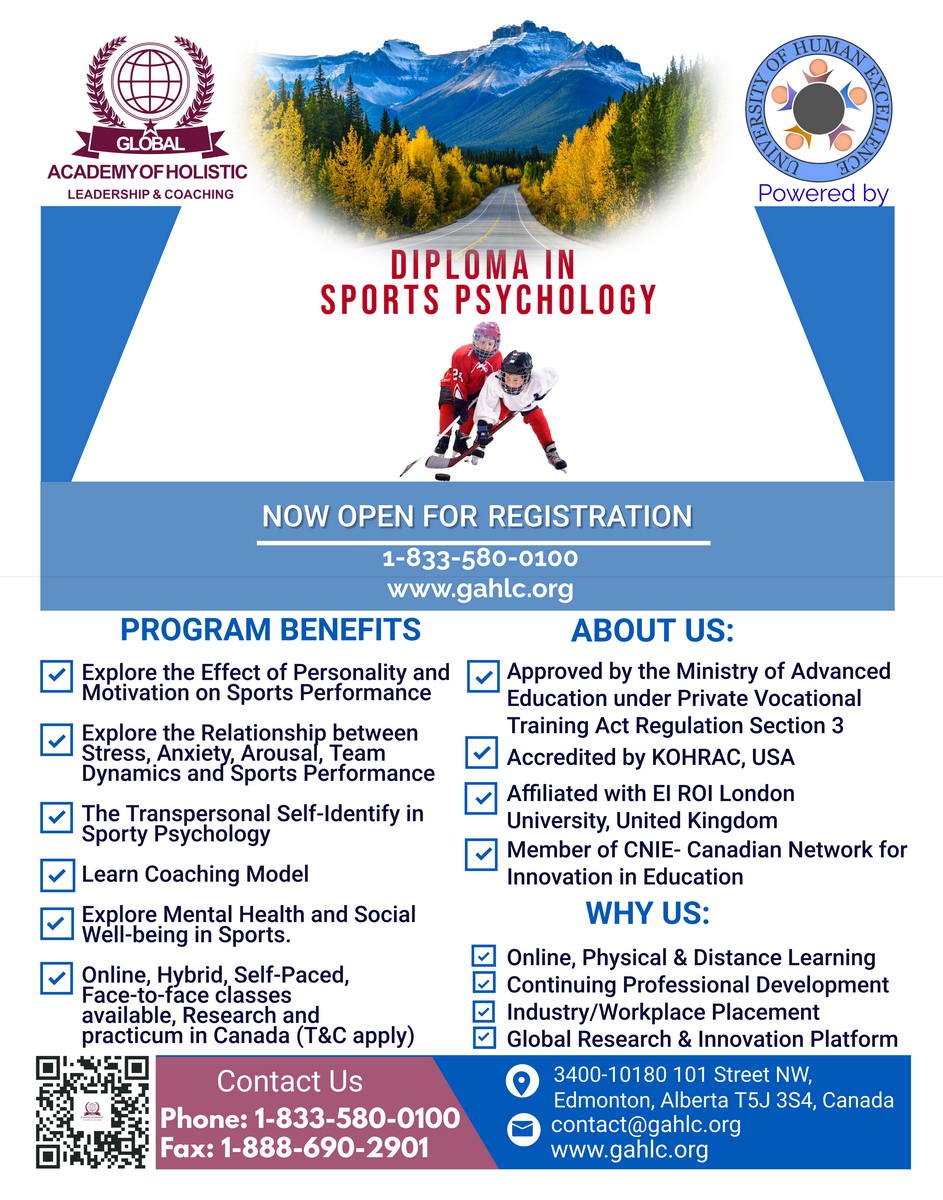
Download Brochure
GAHLC - Diploma in Sports Psychology.pdf
(235 KB)
Details
- Duration: 5 months
- Professor: Prof. Oluwafemi Esan
- Units: 5
- Prerequisites: None
A five months diploma course that provides proficiency using psychological knowledge and skills to address optimal performance and wellbeing of athletes, developmental and social aspects of sports participation and systemic issues associated with sports settings and organizations.
Program Benefits
- Explore the Effect of Personality and Motivation on Sports Performance
- Explore the Relationship between Stress, Anxiety, Arousal, Team Dynamics and Sports Performance
- The Transpersonal Self-Identify in Sporty Psychology
- Learn Coaching Model
- Explore Mental Health and Social Well-being in Sports
- Online, Hybrid, Self Paced, Face-to-face classes available
- Research and Practicum in Canada (Terms & Conditions apply)
Summary
Sports psychology is a proficiency that uses psychological knowledge and skills to address optimal performance and wellbeing of athletes, developmental and social aspects of sports participation and systemic issues associated with sports settings and organizations.
The Benefits of Sports Psychology for Athletes:
- Improve focus and deal with distractions
- Grow confidence in athletes who have doubts
- Develop coping skills to deal with setbacks and errors
- Find the right zone of intensity for your Sport
- Help teams develop communication skills and cohesion
The curriculum design is an integration of transpersonal psychology coupled with modern psychological perspectives on the holistic development of athletes.
Structure
-
Module 1: Explore the effect of personality and motivation on sports performance
This module will explore the impacts of personality and motivation on sports performance using psychological theories on personality traits and human motivation.
Learning Outcomes
At the end of this module, students will be able to- Describe theories of personality and their impacts on sports performance
- Explain the theories of motivation and their effects on sports performance
- Theories of Personality
- Marten's schematic view
- Psychodynamic theory
- Trait theory
- Situational approach
- Interactional approach
- Theories of Motivation
- Trait centred
- Situation centred
- Interactional view
- Types: intrinsic, extrinsic
- Theories: e.g. achievement motivation, attribution theory, …
-
Module 2: Explore the relationship between stress, anxiety, arousal, team dynamics and sports performance
This module explores the relationship between stress, anxiety, and arousal within the context of team dynamics in sports, with a view on their impacts on performance.
Learning Outcomes
At the end of this module, students will be able to- Describe The relationship between stress, anxiety, and arousal and their impacts on sports performance
- Explain The impacts of team dynamics on sport performance
- Stress
- Definition
- Types: Eustress, Distress
- Causes: Internal, external, personal, occupational, sports environments
- Anxiety
- Definition.
- Types: State anxiety, Trait anxiety
- Cause: Negative effect of stress
- Symptoms: Cognitive, somatic, behavioural
- Anxiety
- Definition
- Theories: e.g. Drive theory, inverted U hypothesis, catastrophe theory, individual zones of optimal functioning (IZOF)
- Team Dynamics
- Team processes: e.g. Teams of group development (Tuckman) [forming, storming, norming, performing], Steiner's model of group effectiveness, Ringelmann effect / social loafing
-
Module 3: The Transpersonal Self- Identity in Sport Psychology
The transpersonal has been defined as experiences in which the sense of identity or self extends beyond (trans) the individual or personal to encompass wider aspects of humankind, life, psyche or cosmos. Transpersonal communication: A type of communication level in which one converses/communicates with spirits or someone of a higher power is called Transpersonal communication. It is a communication between self and its beliefs, something in which we believe in, which is higher than us, beyond the body and the mind. The significance of transpersonal consciousness, the awareness of those aspects of the human experience that transcends the sense of a separate self, has always felt self-evident to individuals.
Learning Outcomes
At the end of this module, students will be able to- Explore the Reality of Transpersonal Self
- Examine Transpersonal Communication with the Higher Self
- Evaluate the Psychology of the Self and the Soul
- Explore the Concept of the Will of a Man
- Transpersonal Consciousness
- The Concept of Spiritual Self
- Communicating with the Higher Self
- The Psychology of the Self and the Soul
-
Module 4: Introduction to Coaching Model
There are various effective coaching models that some coaches choose to use to structure their coaching sessions. You may find it helpful to guide your coachee through a logical sequence and provide a framework for your coaching session. Using a model helps in many ways. It helps to give a purpose to the session by defining an outcome, preventing it from becoming a 'chat' with no apparent purpose. It can also be a prompt to ensure that the session stays 'on track. The coach's skill is in knowing what your client needs at a particular moment, so a toolkit of different models is helpful to draw upon and use as appropriate. Probably the most widely known and used model is the GROW coaching model. This simple model helps you as a coach take your coachee from goal setting at the outset of the session through to exploring where they now concern their goals, exploring options they have to moving forward and concluding with a commitment to action.
Learning Outcomes
At the end of this module, students will be able to- Define Coaching as a Model for Personal and Professional Development
- Describe the GROW Coaching Model
- The Principles of Goal Setting
- The GROW Model
- Personal and Professional Development in Sport
-
Module 5: Explore mental health and social wellbeing in sport
This module will explore the impacts of mental health and social well-being on sports performance. Students will analyse the social determinants of social and emotional wellbeing that influence athletes' social world.
Learning Outcomes
At the end of this module, students will be able to- Describe the impacts of mental health on Sports Performance
- Explain the Role of Social Wellbeing on Sports Performance
- Mental health – emotional well-being and resilience to adversity
- Social wellbeing – the ability to function in society and form relationships
- Transpersonal Mental Health care
- Factors affecting mental health and social wellbeing
- Signs and symptoms of poor mental health and social wellbeing
Assessment
Students will write a Reflective Essay of 1000 words covering the learning outcomes for each module. The standard of academic writing is expected to meet the requirement of an academic essay at level 3. Assessment for each module is completed based on the learning outcomes achievement at the unit's assessment criteria standards. Therefore, the learner can achieve a Pass or Fail for this module based on the quality of the work submitted and the assessor's judgments made against the criteria provided.
What is the structure of a reflective essay?
A reflective essay should follow the classic essay format of introduction, body, and conclusion. Some other standard forms include journaling or using a reflective model for only part of an essay or assignment. A journal is a collection of entries made on a regular basis (e.g. daily or weekly). Students should have a reflective journal for all the modules.
Taxation for Corporate Matters
(Certificate Course on Taxation for Corporate Matters) ^
Take an in-depth look into the corporate tax.
Brochure
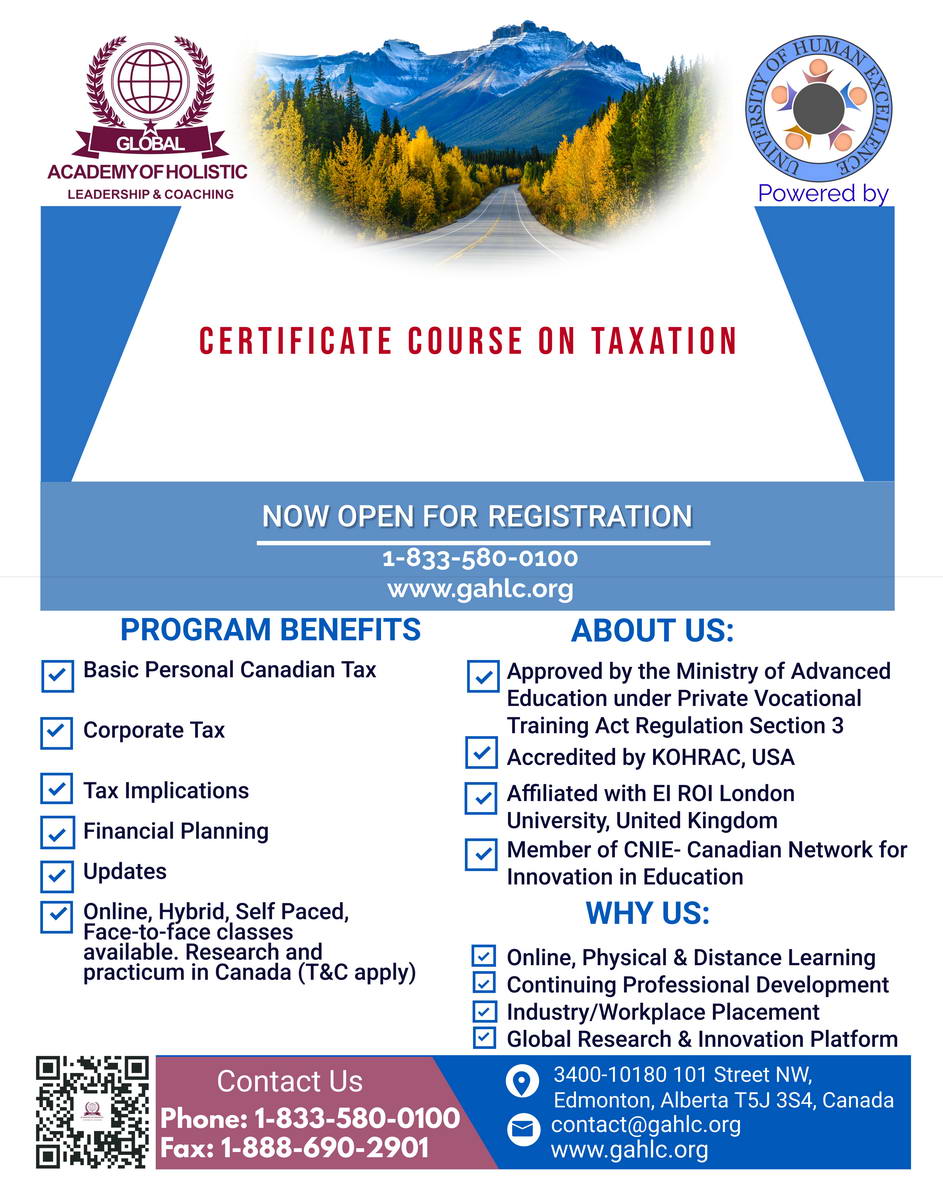
Download Brochure
GAHLC - Certificate Course on Taxation.pdf
(206 KB)
Details
- Duration: tbd
- Professor: tbd
- Units: tbd
- Prerequisites: None
This course provides an in-depth look into the corporate tax. Includes tax implications, financial planning and more. With online- and face-to-face classes. Research and practicum in Canada (conditions apply).
Program Benefits
- Corporate Tax
- Tax Implications
- Financial Planning
- Updates
- Online, Hybrid, Self Paced, Face-to-face classes available
- Research and Practicum in Canada (Terms & Conditions apply)
Objectives
More Information coming soon.
Taxation for Personal Matters
(Certificate Course on Taxation for Personal Matters) ^
Receive a basic look into the Canadian personal tax.
Brochure

Download Brochure
GAHLC - Certificate Course on Taxation.pdf
(206 KB)
Details
- Duration: tbd
- Professor: tbd
- Units: tbd
- Prerequisites: None
This course provides a basic look into the Canadian personal tax. Includes tax implications, financial planning and more. With online- and face-to-face classes. Research and practicum in Canada (conditions apply).
Program Benefits
- Basic Personal Canadian Tax
- Tax Implications
- Financial Planning
- Updates
- Online, Hybrid, Self Paced, Face-to-face classes available
- Research and Practicum in Canada (Terms & Conditions apply)
Objectives
More Information coming soon.
Brochure
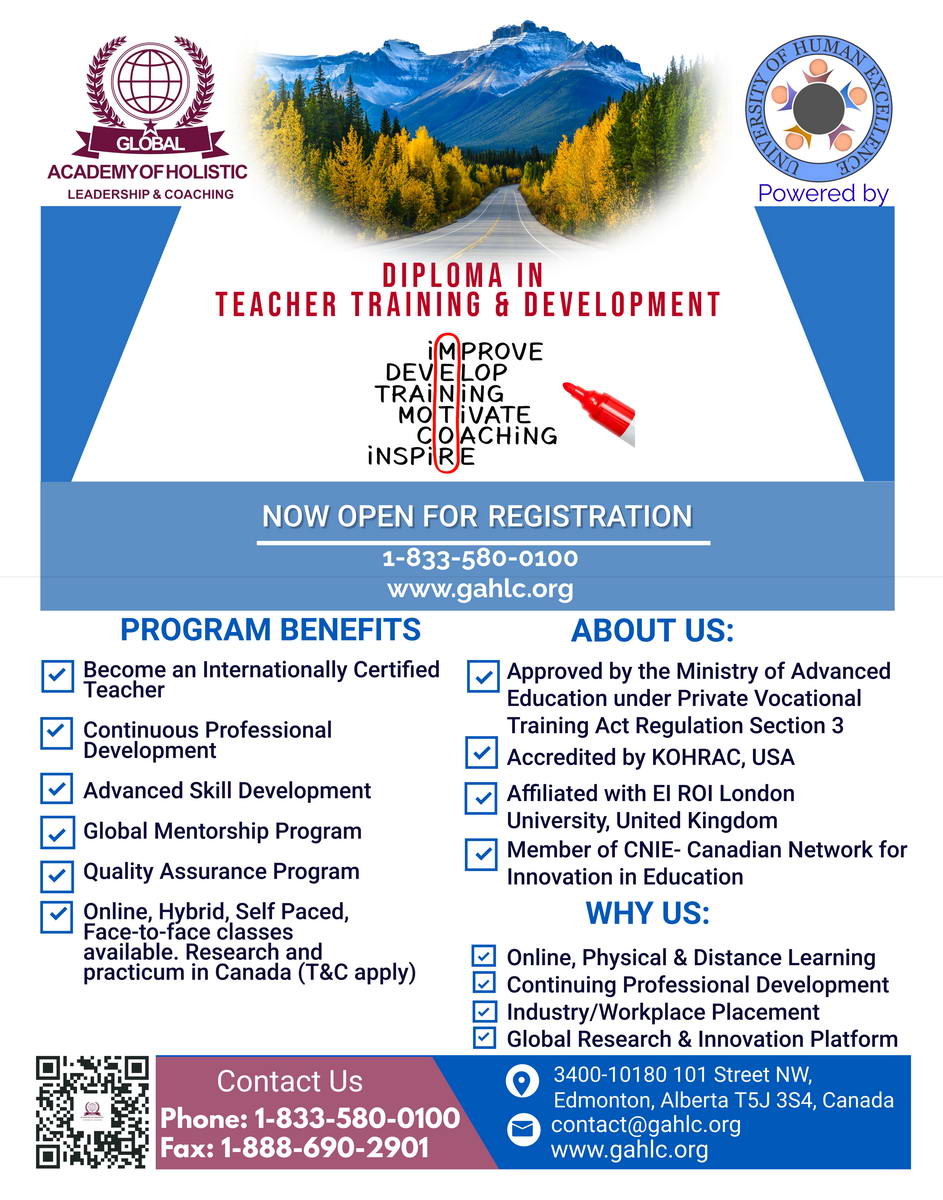
Download Brochure
GAHLC - Diploma in Teacher Training and Development.pdf
(225 KB)
Details
- Duration: 2 months
- Professor: tbd
- Units: tbd
- Prerequisites: None
A two months course intended for educators and vice councellors about how to maintain quality in education. Planned for Aril 2022. While our monthly webinar can be accessed for free, you will gain access to additional discussions and consultancy sessions with your purchase.
Program Benefits
- Become an Internationally Certified Teacher
- Continuous Professional Development
- Advanced Skill Development
- Global Mentorship Program
- Quality Assurance Program
- Online, Hybrid, Self Paced, Face-to-face classes available
- Research and Practicum in Canada (Terms & Conditions apply)
Structure
- Structure to be determined.
Transpersonal Education Philosophy
(Level 3 Certificate in Transpersonal Education Philosophy) ^
Transpersonal Ontology, Transpersonal Philosophy of Education, Emancipatory Concept of Higher Education
Brochure
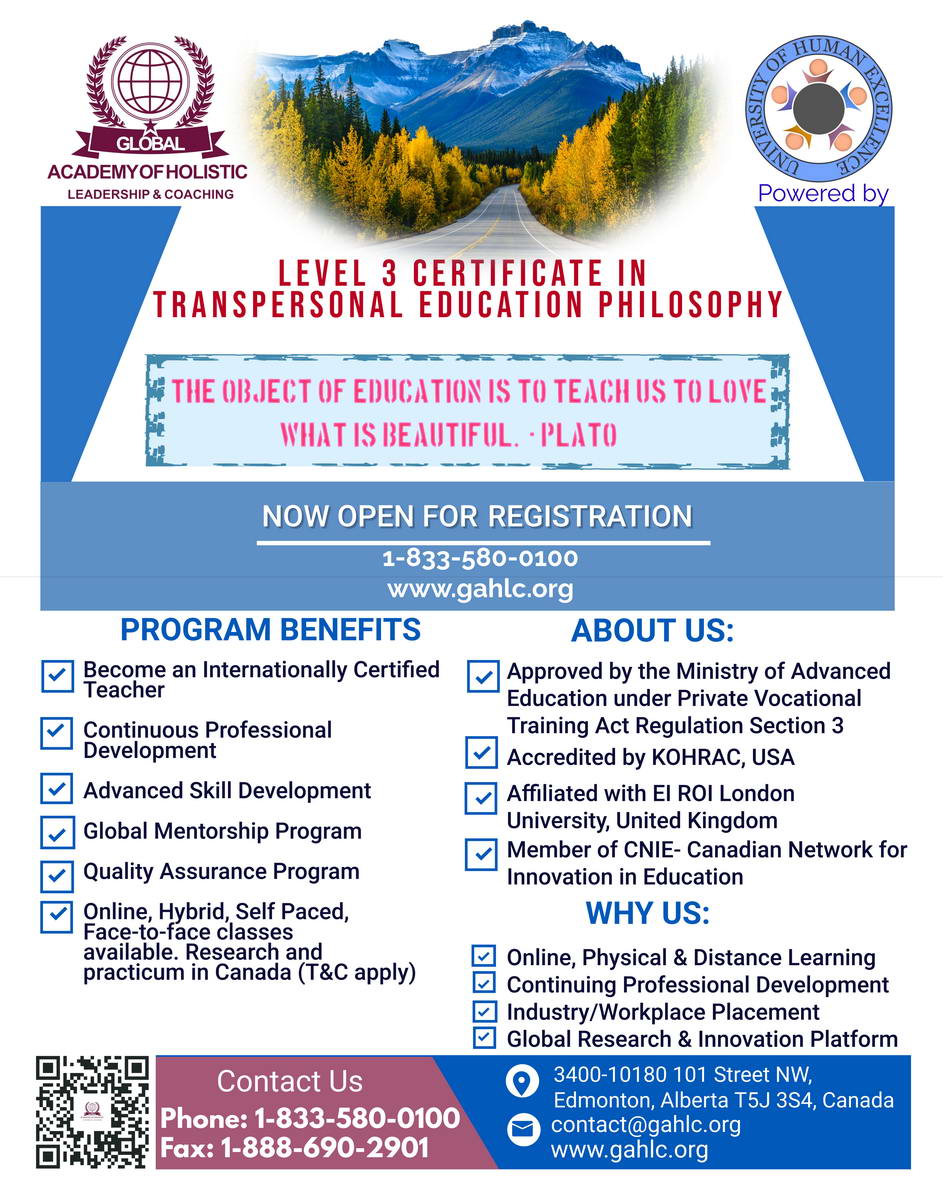
Download Brochure
GAHLC - Certificate in Transpersonal Education Philosophy.pdf
(236 KB)
Details
- Duration: 3 months
- Professor: Prof. Oluwafemi Esan
- Units: 3
- Prerequisites: None
A three months course intended for students of Transpersonal Education Philosophy and professionals with general interest in the topic. The course is about philosophic concepts such as the concept of existence, being, becoming, and reality, the nature and aims of education, and emancipatory knowing.
Program Benefits
- Become an Internationally Certified Teacher
- Continuous Professional Development
- Advanced Skill Development
- Global Mentorship Program
- Quality Assurance Program
- Online, Hybrid, Self Paced, Face-to-face classes available
- Research and Practicum in Canada (Terms & Conditions apply)
Summary
Perhaps the earliest attempt to define transpersonal education is proposed by Clark (1974, p.1), who asserts that ‘transpersonal education, like science, is concerned with knowledge and discovery of truth… It is also addressed to questions of value, meaning and purpose. From this definition, Clark (1974) further discusses that transpersonal education is the process of discovery and self-transcendence based on spiritual practice and subjective experience. Consequently, higher education students should derive a set of values through intrinsic learning, a lifelong approach concerned with the discovery of identity and the discovery of vocation (Maslow, 1971). While Clark (1974, p.7) suggests that the objective of transpersonal education is ‘the realization and maintenance of higher states of consciousness in which intrapersonal and interpersonal actualization is subsumed’, Moore (1975) provides a different perspective, that the objective for transpersonal education is to combine the various domains of ‘being’, such as the cognitive, affective, and psychomotor domains leading to a transformative learning experience.
Structure
-
Module 1: Transpersonal Ontology
Ontology is the branch of philosophy that studies concepts such as existence, being, becoming, and reality. It includes the questions of how entities are grouped into basic categories and which of these entities exist on the most fundamental level. This module aims to explore the very source of reality and existence of the human spirit. Students will examine psychospiritual philosophies (not comparable) of or pertaining to the relationship between spirituality and the mind. The goal of this module is to establish the fundamental principle of spiritual existence as the true nature of humanity.
Learning Outcomes
At the end of this module, students will be able to- Examine the Philosophy of Creationism
- Explore the Spiritual Reality of the Transpersonal Self
- Reflect on Human Existence Before Physical Birth
-
Module 2: Transpersonal Ontology
Philosophy of education is the branch of applied or practical philosophy concerned with the nature and aims of education and the philosophical problems arising from educational theory and practice. Because that practice is ubiquitous in and across human societies, its social and individual manifestations so varied, and its influence so profound, the subject is wide-ranging, involving issues in ethics and social / political philosophy, epistemology, metaphysics, philosophy of mind and language, and other areas of philosophy.
Learning Outcomes
At the end of this module, students will be able to- Explore Transpersonal Philosophy of the Mind
- Reflect on the Purpose of Transpersonal Education
- Examine Transpersonal Epistemology
-
Module 3: Emancipatory Concept of Higher Education
Emancipatory knowing involves critically examining social, political, and institutional structures to uncover social injustices and inequities and disrupt the status quo, as well as asking critical questions. Emancipatory knowing is the human ability to recognize social and political problems of injustice or unfairness, realize that things could be different, and piece together complex elements of experience and context to change a situation to a situation that improves people’s lives. Emancipatory knowing cultivates awareness of how problematic conditions converge, reproduce, and remain in place to sustain a status quo that is unfair for some groups within society.
Learning Outcomes
At the end of this module, students will be able to- Explore the power dynamics that create knowledge and the social and political context of education
- Reflect on the Dominant Philosophy of Higher Education
- Examine The Concept of Emancipatory knowing; means questioning the nature of knowledge and the ways in which knowledge itself is produced
Assessment
Students will write a reflective essay of 1000 words covering the THREE learning outcomes for each module. The standard of academic writing is expected to meet the requirement of an academic essay at level 3. Assessment for this module is completed based on the learning outcomes achievement at the unit's assessment criteria standards. Therefore, the learner can achieve a Pass or Fail for the module based on the quality of the work submitted and the assessor's judgments made against the criteria provided.
What is the structure of a reflective essay?
A reflective essay should follow the classic essay format of introduction, body, and conclusion. Some other standard forms include journaling or using a reflective model for only part of an essay or assignment. A journal is a collection of entries made on a regular basis (e.g. daily or weekly). Students should have a reflective journal for all the modules.
Transpersonal Mental Health Therapy Advocacy
(Level 4 Diploma in Transpersonal Mental Health Therapy Advocacy) ^
Transpersonal Therapy does focus on the health of a person's spirit.
Brochure
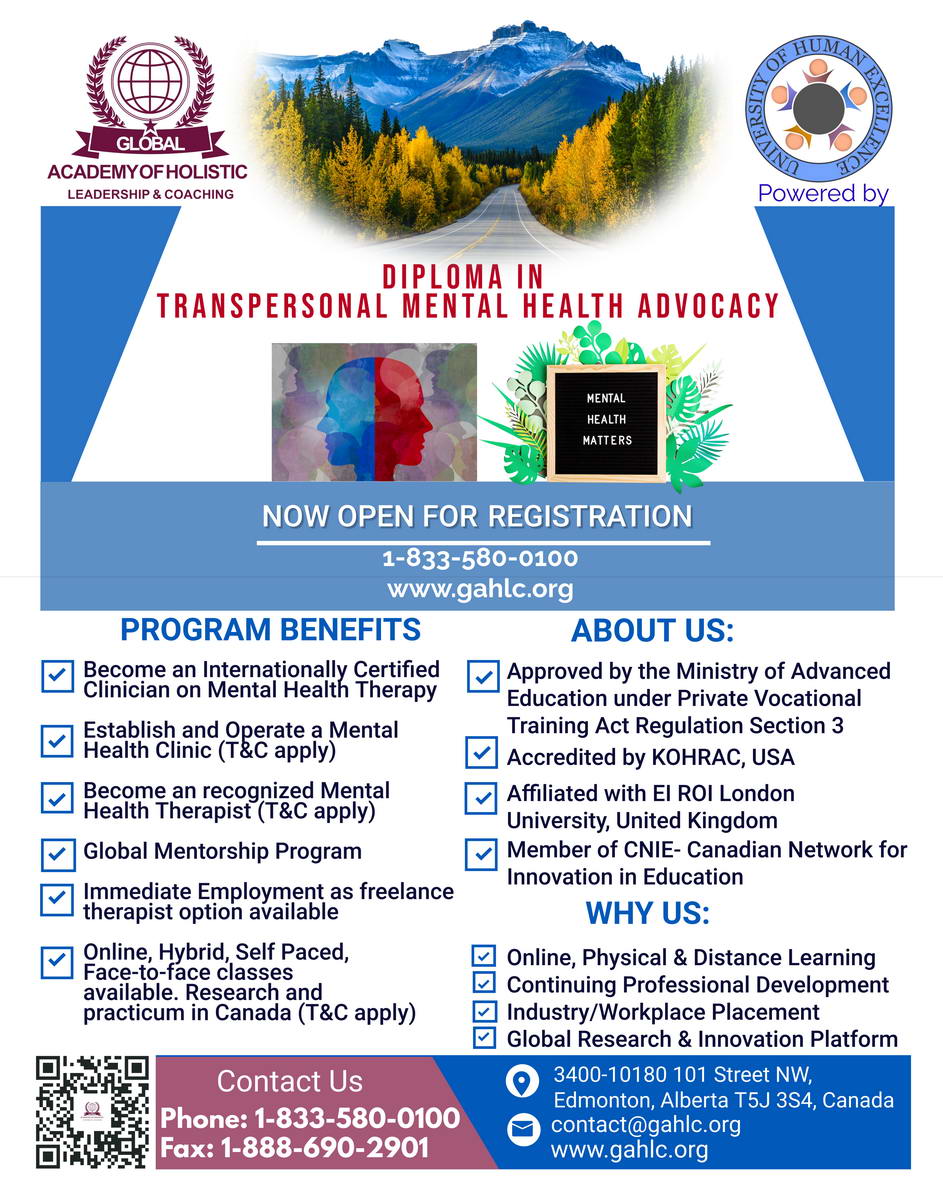
Download Brochure
GAHLC - Diploma in Transpersonal Mental Health Therapy.pdf
(244 KB)
Details
- Duration: 4 months
- Professor: Prof. Oluwafemi Esan
- Units: 4
- Prerequisites: None
A four months diploma course that includes topics about transpersonal ontology, understanding the spiritual nature of the human mind, understanding the principles of eternal purpose of life, and the transpersonal mental health practitioner framework.
Program Benefits
- Become an Internationally Certified Clinician on Mental Health Therapy
- Establish and Operate a Mental Health Clinic (Terms & Conditions apply)
- Become an recognized Mental Health Therapist (Terms & Conditions apply)
- Global Mentorship Program
- Immediate Employment as Freelance Therapist option available
- Online, Hybrid, Self Paced, Face-to-face classes available
- Research and Practicum in Canada (Terms & Conditions apply)
Summary
Transpersonal therapy is a type of therapy that doesn't focus on a person's body and mind but the health of a person's spirit. This type of therapy emphasizes a person's spiritual path or spiritual enlightenment during his life. Many people are also working toward becoming more spiritually aware. The word "transpersonal" loosely translates to beyond the person or beyond the self. Nearly anyone can benefit from transpersonal therapy. However, some people may be more respective to this type of therapy than others. For instance, people who are looking to explore their spiritual sides and those open to new experiences will often benefit more from transpersonal therapy.
Structure
-
Module 1: Transpersonal Ontology
Ontology is the branch of philosophy that studies concepts such as existence, being, becoming, and reality. It includes how entities are grouped into basic categories and which of these entities exist on the most fundamental level.
This module aims to explore the very source of reality and the existence of the human spirit. Students will examine psychospiritual philosophies (not comparable) of or about the relationship between spirituality and the mind. This module aims to establish the fundamental principle of spiritual existence as the true nature of humanity.
Learning Outcomes
At the end of this module, students will be able to- Examine the origin of existence
- Explore the spiritual reality of human nature
- Reflect on human existence before physical birth
- Describe the practical implications of the Divine Source of reality on Mental Wellbeing
- Week 1: The Hebrew Philosophy of Creationism
- Week 2: Developing Spiritual Health for Mental Health and Emotional Wellbeing
- Week 3: Existence before the beginning of time
- Week 4: The Role of Divine Source on Mental Wellbeing
-
Module 2: Understanding the Spiritual Nature of the Human Mind
The mind is the set of faculties responsible for mental phenomena. Often the term is also identified with the phenomena themselves. These faculties include thought, imagination, memory, will and sensation. The aim of this module is to establish the principles of the spiritual nature of the mind. Students will learn how to deal with negative thoughts in managing emotions from the spiritual existence of the human mind.
Learning Outcomes
At the end of this module, students will be able to- Describe the Spiritual Origin of Human Thoughts
- Examine the Influence of Negative Thoughts on Mental and Emotional Wellbeing
- Explore the Principles of Transpersonal Cognitive Behavioural Therapy
- Reflect on the Applications of Transpersonal Cognitive Behavioural Therapy Models in Mental Health
- Week 1: Exploring the Hebrew Concept of the Mind
- Week 2: Fundamentals of Transpersonal Cognitive Behavioural Therapy
- Week 3: Transpersonal Approach to Dealing with Depression and Schizophrenia
- Week 4: Transpersonal Approach to Dealing with Suicide Thoughts Patterns
-
Module 3: Understanding the Principles of Eternal Purpose of Life
Awareness of the patient's need to find a sense of meaning and purpose in life, their personal search for answers to deeper questions concerning birth, life and death and awareness of the difference between spirituality and religion and their inter-relatedness. This module aims to establish the practical implications of finding a sense of personal purpose in an individual's mental and emotional wellbeing.
Learning Outcomes
At the end of this module, students will be able to- Explore the Source of Personal Purpose
- Examine the Role of Divine Communication in Finding a Sense of Personal Purpose
- Reflect on the Concept of Eternal Vocation
- Describe the Difference between Spirituality and Religion
- Week 1: The Eternal Source of Personal Purpose
- Week 2: Purpose the Source of Potential
- Week 3: The Principles of Self-Manifestation
- Week 4: The Influence of Self-Manifestation on Mental and Emotional well-being
-
Module 4: The Transpersonal Mental Health Practitioner Framework
Our Transpersonal Mental Health Practitioner Framework is underpinned by the three components of spiritual health: Religious, Individualistic, and Material world oriented. The religious components may result from human connection with God, including a sense of relationship with God, love, prayer, the feeling that God is effective, and God-oriented knowledge, attitude, and behaviours. The individualistic component comes from the human connection with himself. Instances include self-scrutiny, examining the meaning of life, hope, self-actualization, moral virtues, peace, responsibility for oneself, balance, transcendence, values, mysticism, culture, knowledge, attitude, and behaviours related to oneself.
Material World-Oriented Component
This refers to the human connection with others and nature. Connection with others creates a sense of responsibility toward them, unconditional love, forgiveness, pacifism, harmony with others, and knowledge, attitude, and behaviours in relation with others.
Indicative Contents- Week 1: Transpersonal Counselling Approach of the Holy Spirit To Mental Health
- Week 2: The Transpersonal Coaching Approach to Mental Health
- Week 3: Transpersonal Psychodynamic Theory Based on Biblical Theology
- Week 4: The spiritual Health Framework
Assessment
Students will write a reflective essay of 1500 words covering the learning outcomes for each module. The standard of academic writing is expected to meet the requirement of an academic essay at level 4. Assessment for this module is completed based on the learning outcomes achievement at the unit's assessment criteria standards. Therefore, the learner can achieve a Pass or Fail for the module based on the quality of the work submitted and the assessor's judgments made against the criteria provided.
What is the structure of a reflective essay?
A reflective essay should follow the classic essay format of introduction, body, and conclusion. Some other standard forms include journaling or using a reflective model for only part of an essay or assignment. A journal is a collection of entries made on a regular basis (e.g. daily or weekly). Students should have a reflective journal for all the modules.
Transpersonal Psychology I
(Level 6 Diploma in Transpersonal Psychology) ^
Therapeutic Intervention (Integration Of Spirituality Into Psychiatric Practice)
Brochure
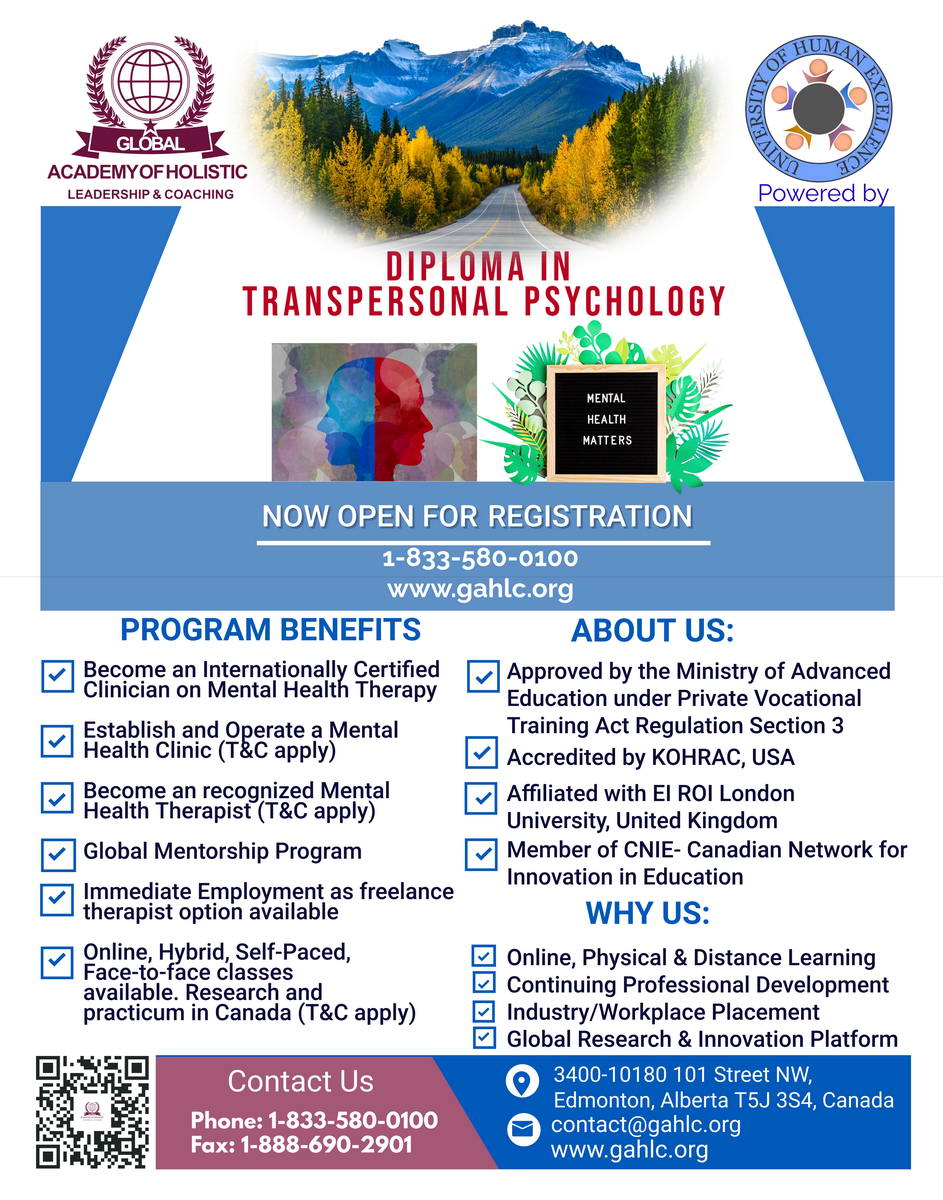
Download Brochure
GAHLC - Diploma in Transpersonal Psychology.pdf
(246 KB)
Details
- Duration: 8 months
- Professor: Prof. Oluwafemi Esan
- Units: 5
- Prerequisites: None
The health professions have primarily followed a medical model that seeks to treat patients by focusing on medicines and surgery and gives less importance to beliefs and faith – in healing, in the physician and the doctor-patient relationship. This reductionism or mechanistic view of patients as being only a material body is no longer satisfactory. Patients and physicians have begun to realise the value of faith, hope and compassion in the healing process. The medical model is, therefore, focused on physical causes and largely ignores environmental or psychological causes.
Program Benefits
- Become an Internationally Certified Clinician on Mental Health Therapy
- Establish and Operate a Mental Health Clinic (Terms & Conditions apply)
- Become an recognized Mental Health Therapist (Terms & Conditions apply)
- Global Mentorship Program
- Immediate Employment as Freelance Therapist option available
- Online, Hybrid, Self Paced, Face-to-face classes available
- Research and Practicum in Canada (Terms & Conditions apply)
Structure
- Unit 1: Finding Purpose and Meaning in Life
Awareness of the patient’s need to find a sense of meaning and purpose in life, his/her personal search for answers to deeper questions concerning birth, life and death and awareness of the difference between spirituality and religion and their inter-relatedness. - Unit 2: Understanding Altered States of Consciousness
Knowledge of spiritual crises, meditation, prayer and altered states of Consciousness, including Near-Death Experiences (NDEs). - Unit 3: Understanding the Spiritual Significance of Positive and Negative Emotions in Mental Health
Knowledge of the spiritual significance of anxiety, doubt, guilt and shame, and the spiritual importance of love, altruism and forgiveness, and their relation to mental health. - Unit 4: Application of Quantitative and Qualitative Research to Spirituality and Psychiatric Practice
Familiarity with issues related to research, for example, the application of quantitative and qualitative research to the field of spirituality and psychiatric practice and the contribution of research to understanding the neurophysiology and efficacy of prayer, meditation, forgiveness and love. Competence in recognition of his/her own counter-transference responses to spiritual disclosures. - Unit 5: Understanding The Reality of Spiritual Identity
For some children and families, cultural and spiritual identity are central to health and wellbeing. Service provision is more effective if it respects and incorporates service users’ cultural and spiritual understandings. Spiritual identity entails identifying with a particular belief system and is deeply important for many children and families. Spiritual identity may or may not be associated with organised religion or belief systems.
Transpersonal Psychology II
(Level 6 Professional Diploma in Transpersonal Psychology) ^
A Transpersonal Mental Health Therapy Training
Brochure

Download Brochure
GAHLC - Diploma in Transpersonal Psychology.pdf
(246 KB)
Details
- Duration: 10 months
- Professor: Prof. Oluwafemi Esan
- Modules: 8
- Prerequisites: Level 6 Diploma in Transpersonal Psychology is recommended
The health professions have primarily followed a medical model that seeks to treat patients by focusing on medicines and surgery and gives less importance to beliefs and faith – in healing, in the physician and the doctor-patient relationship. This reductionism or mechanistic view of patients as being only a material body is no longer satisfactory. Patients and physicians have begun to realise the value of faith, hope and compassion in the healing process. The medical model is, therefore, focused on physical causes and largely ignores environmental, psychological, and spiritual causes of mental health illness. The aim of our transpersonal mental health therapy training is to integrate spiritual health as the foundation for sound mental and emotional wellbeing. Spiritual health includes a purposeful life, transcendence and actualization of different dimensions and capacities of human beings. Spiritual health creates a balance between spiritual, physical, psychological, and social aspects of human life.
Religious Components
The religious components may be the result of human connection with God, including a sense of connection with God, love of God, prayer, the feeling that God is effective, and God-oriented knowledge, attitude, and behaviours. The individualistic component comes from human connection with himself. Instances include self-scrutiny, examining the meaning of life, hope, self-actualization, moral virtues, peace, responsibility for oneself, balance, transcendence, values, mysticism, culture, and knowledge, attitude, and behaviours in relation with oneself.
Material World-Oriented Component
This refers to human connection with others and the nature. Connection with others creates a sense of responsibility toward them, unconditional love, forgiveness, pacifism, harmony with others, and knowledge, attitude, and behaviours in relation with others.
Program Benefits
- Become an Internationally Certified Clinician on Mental Health Therapy
- Establish and Operate a Mental Health Clinic (Terms & Conditions apply)
- Become an recognized Mental Health Therapist (Terms & Conditions apply)
- Global Mentorship Program
- Immediate Employment as Freelance Therapist option available
- Online, Hybrid, Self Paced, Face-to-face classes available
- Research and Practicum in Canada (Terms & Conditions apply)
Structure
- Module 1: Transpersonal Ontology
Ontology is the branch of philosophy that studies concepts such as existence, being, becoming, and reality. It includes the questions of how entities are grouped into basic categories and which of these entities exist on the most fundamental level. - Module 2: Understanding the Spiritual Nature of the Human Mind
The mind is the set of faculties responsible for mental phenomena. Often the term is also identified with the phenomena themselves. These faculties include thought, imagination, memory, will and sensation. - Module 3: Understanding the Principles of Eternal Purpose of Life
Awareness of the patient’s need to find a sense of meaning and purpose in life, his/her personal search for answers to deeper questions concerning birth, life and death and awareness of the difference between spirituality and religion and their inter-relatedness. - Module 4: Psychosynthesis Transpersonal Theory of Consciousness
From a psychosynthesis point-of-view, our life’s journey is to seek, reconnect, and synthesize the consciousness and will of the Self with the consciousness and will of the “I” – in other words, to synthesize the transpersonal with the personal. What distinguishes psychosynthesis from most other psychologies is the understanding that the Self relates to the higher qualities within human beings that allow them to foster their I-Self connection and grow towards their authentic personality. - Module 5: Understanding the Role of Divine Communication in Spiritual Health
Spiritual wellness acknowledges our search for deeper meaning in life. When we're spiritually healthy, we feel more connected to not only a higher power, but to those around us. We have more clarity when it comes to making everyday choices, and our actions become more consistent with our beliefs and values. - Module 6: The Transpersonal Self-Identity
The transpersonal has been defined as experiences in which the sense of identity or self extends beyond (trans) the individual or personal to encompass wider aspects of humankind, life, psyche or cosmos. - Module 7: Understanding the Influence of Religion on Mental Health
Psychology of religion consists of the application of psychological methods and interpretive frameworks to the diverse contents of religious traditions as well as to both religious and irreligious individuals. Harking back to Sigmund Freud, some psychologists have characterized religious beliefs as pathological, seeing religion as a malignant social force that encourages irrational thoughts and ritualistic behaviours. - Module 8: The Transpersonal Mental Health Practitioner Framework
Our transpersonal mental health practitioner framework is underpinned by the three components of spiritual health : Religious, Individualistic, and Material world-oriented.
Copyright ©2021-2023 by Global Academy of Holistic Leadership and Coaching Inc.
All rights reserved.
[ Usage Agreement ] [ Privacy Policy ]
